
ISSUE No 49 JUNE - SEPTEMBER 2023 Reducing emissions Decarbonizing the Caribbean PROFILE: MARTIN MEDINA I LNG BUNKERING I WIMAC I CSEC PHOTOS Supporting future seafarers
sponsored by the CSA Single Window Opportunities in Belize
Cadets

MISSION STATEMENT
To promote and foster the highest quality service to the maritime industry through training development; working with all agencies, groups and other associations for the benefit and development of its members and the peoples of the Caribbean region.
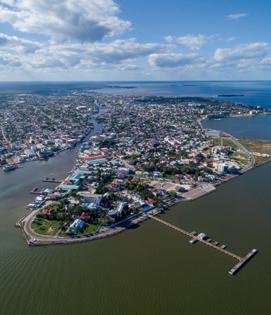

SHIPPING ASSOCIATION COUNCIL 2022-2023
President: Marc Sampson
Immediate Past President: Juan Carlos Croston
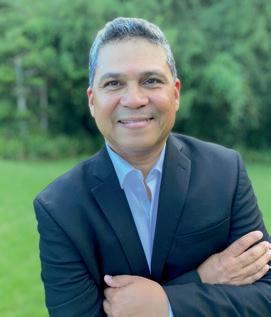
Vice President: William Brown
Group A Chairman: Eduardo Pagán
Group A Representative: Nazilia Simone Phillips
Group A Representative: Rhett Chee Ping
Group A Representative: Desmond Sears
Group B Chairman: Mark Williams
Group B Representative: Cristyan Peralta
Group C Chairman: María del Mar Rodríguez
Group C Representative: Robert Bosman
Group D Chairman: JC Barona
Group D Representative: Sabine Bajazet
CSA General Manager: Milaika Capella Ras
CARIBBEAN SHIPPING ASSOCIATION
4 Fourth Avenue, Newport West PO Box 1050, Kingston CSO, Jamaica
Tel: +876 923-3491
Fax: +876 757-1592
Email: csa@cwjamaica.com www.caribbeanshipping.org
ADVERTISING
advertising@caribbean-maritime.com
Tel: +44 (0)1206 752902
PUBLISHER
Land & Marine Publications Ltd
6 The Square, Ipswich, Suffolk
IP5 3SL, United Kingdom
Email: publishing@landmarine.com
www.landmarine.com
Caribbean Maritime is delivered to subscribers in biodegradable packaging and the magazine is produced using paper from PEFC certified sources implementing sustainable forestry policies to help preserve our environment.
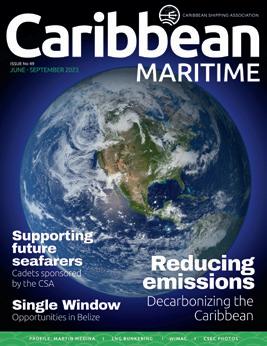
CONTENTS 3 FROM THE CSA PRESIDENT Working tirelessly to achieve milestones 6 PROFILE: MARTIN MEDINA Energy, ambition, and willingness 9 CSA TRAINING TRUST FUND Supporting the Region’s Training and Development 14 DECARBONIZATION The Region's maritime pathway to Decarbonization 18 LNG BUNKERING Shell launches landmark Caribbean LNG Bunkering 20 SINGLE WINDOW A window of opportunities for Belize 23 THE CARIBBEAN MARITIME UNIVERSITY New partnerships, plans and programs 27 WIMAC Dominica’s Doumbia-Henry bids for top role 29 HISTORY: STORIES FROM MARITIME'S PAST National Shipping of America 33 CSA'S CSEC PHOTOS 41 ROUNDUP The latest news from around the Caribbean 47 ADVANTUM Navigating Cybersecurity and Data Privacy CaribbeanMaritimeMagazine cm_magazine @caribbeanmaritimemagazine www.caribbean-maritime.com
THE OFFICIAL JOURNAL OF THE
Views and opinions expressed by writers in this publication are their own and published purely for information and discussion and in the context of freedom of speech. They do not necessarily represent the views and opinions of the Caribbean Shipping Association – The Publisher. ©2023 Land & Marine Publications Ltd.
49
to September 2023 6 18 20 1 www.caribbean-maritime.com
ISSUE No
June
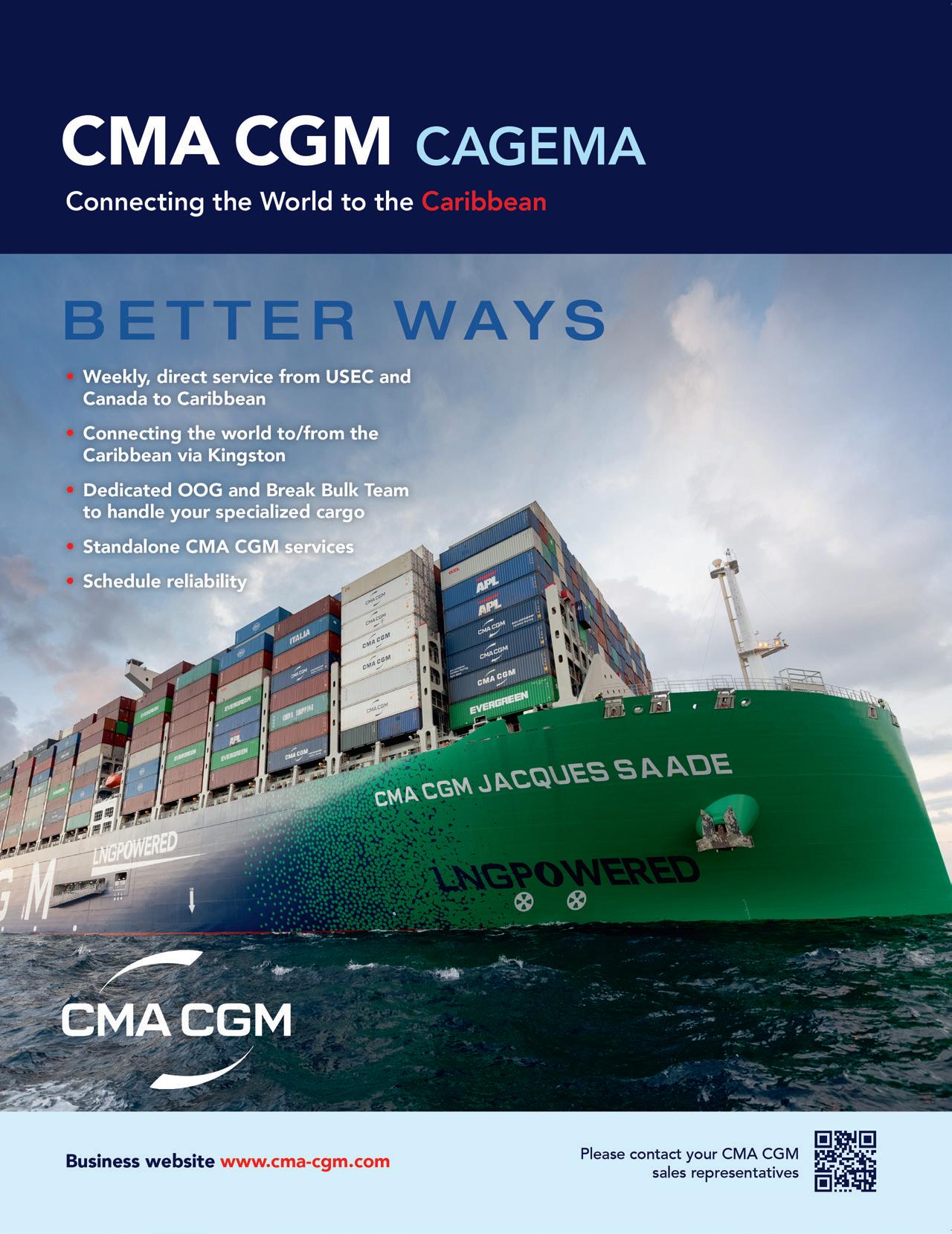
Working tirelessly to achieve milestones
The regional maritime industry is at an integral juncture as players continue to recover from recent disruptions and find the balance between necessity-based changes and tangible developments.
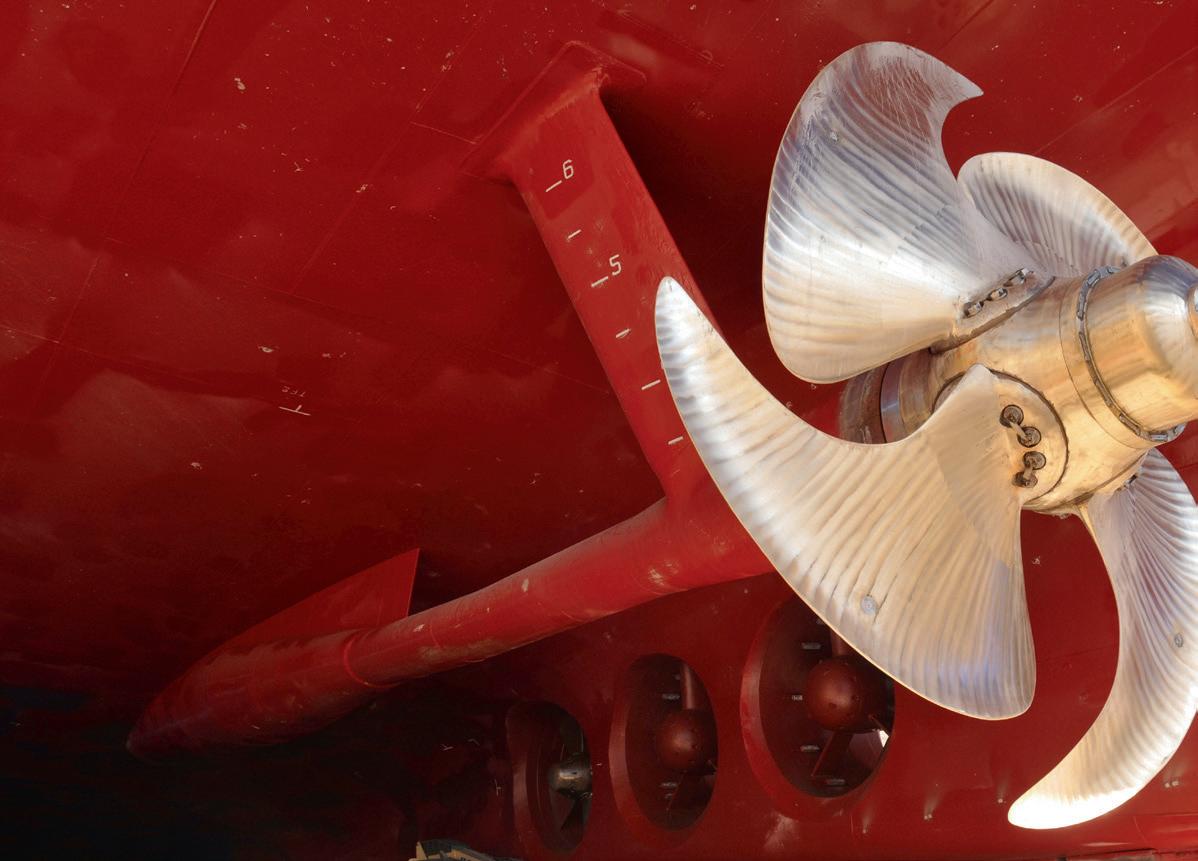
which have helped to create a supportive and collaborative environment for our members.
Marc Sampson President Caribbean Shipping Association

The Caribbean Shipping Association (CSA) has worked tirelessly over the past two years to achieve this and have some remarkable milestones to show for it. We have forged strong partnerships with key stakeholders in the industry, including governments, non-governmental organizations, and various maritime authorities,
The CSA’s recent staging of the Caribbean Shipping Executives’ Conference (CSEC) in Fort Lauderdale, Florida is testament yet to our ongoing efforts to galvanize perspectives and approaches on matters that impact us as a region with interrelated economies. From security to decarbonization, the cruise industry’s outlook, paperless processes, the supply chain crisis and more, we undertook the difficult mission
FROM THE CSA PRESIDENT 3 www.caribbean-maritime.com
to determine what takes precedence, and how we advance those mutual priorities.
It’s important that we do not understate the necessity of these summits as they are critical to unifying our efforts and generating sustainable expansion. With nearly 300 delegates in attendance, we are confident the information shared and the discourse that followed each session will inform our approach to business operations.
It also bodes well for our upcoming annual general meeting in Trinidad and Tobago from October 23-24, 2023, where we will continue the conversations. We look forward to seeing you there. Sincere gratitude to our Platinum Network members Boskalis, Kingston Wharves Ltd, Shipco Transport, Svitzer, TOTE Maritime, and Tropical Shipping, without whom this would not be possible.
Effective
Importantly, the CSA’s newly inked Memorandum of Understanding with the Inter-American Development Bank to accelerate maritime decarbonization came was partially realized through two in-depth panels at the CSEC. Not only will this three-year partnership enhance our economic development, but it also has positive implications for creating greater efficiency within the sector. The prospects are tremendous, to say the least.
Sustainability is an urgent issue and the CSA has taken proactive steps to promote eco-friendly practices within the industry. This includes encouraging the use of alternative fuels, implementing green port initiatives, and advocating for sustainable business practices at our conferences and through our strategic collaborations.
The CSA has also been working to reduce carbon emissions, improve waste management practices, and promote sustainable shipping.
Our concentration on training has become even more pronounced with the staging of multiple workshops and trainings since the start of the year. So far, we have
offered two cohorts of a six-week professional sales training and an ISO container tanks handling awareness session to our members without charge. While we do have restraints, we also acknowledge the inherent duty to the industry to foster an environment of continual learning, upskilling and professional growth.
Accelerate
The CSA is helping to create a more competent and effective shipping industry in the Caribbean, which is crucial for promoting economic growth and development in the region. We hope our proactive and collaborative approach will make a significant difference in addressing the
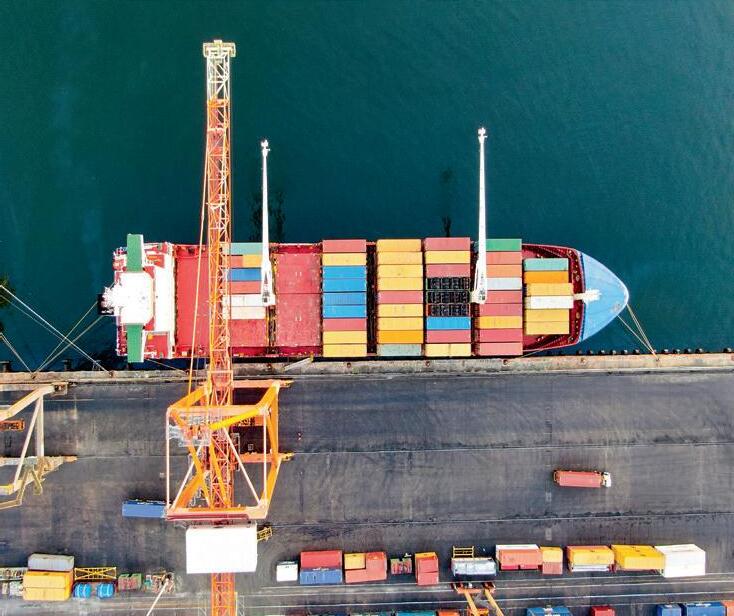
many challenges facing the maritime industry today.
As we look ahead, we are excited about the many opportunities for the Caribbean shipping industry. We remain committed to our efforts to promote growth and development, and identifying and addressing the challenges that we may face along the way.
I would like to take this opportunity to thank all our members, partners, and stakeholders for their continued support and trust in the Caribbean Shipping Association. We are committed to working together with you to achieve our common goals and to ensure that the shipping industry in the Caribbean continues to thrive.
Thank you.
www.caribbeanshipping.org 4 Caribbean Maritime | June-September 2023
Not only will this three-year partnership enhance our economic development, but it also has positive implications for creating greater efficiency within the sector. The prospects are tremendous, to say the least.”
Ievgenii Bakhvalov / Shutterstock.com
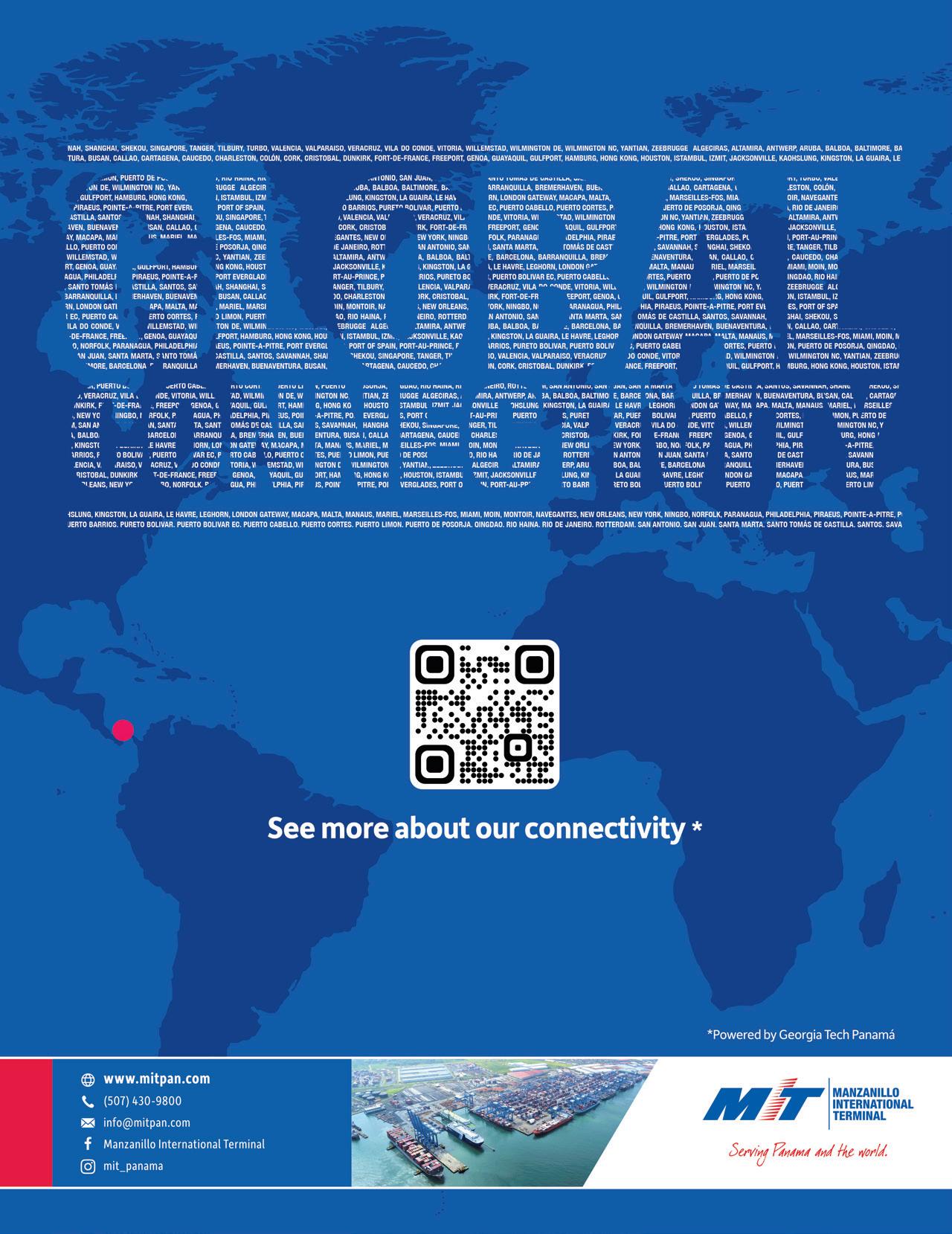
Energy, ambition, and willingness
Martin Medina
Martin Medina leads a Florida-based freight forwarder or NVOCC who grew up in humble circumstances in his native Dominican Republic. His career is proof hard work, energy, ambition, and willingness to move away from familiar surroundings is nearly always a recipe for success. Martin talks to Caribbean Maritime about his early life in Santo Domingo and his various (and, it seems, always upward) career moves.
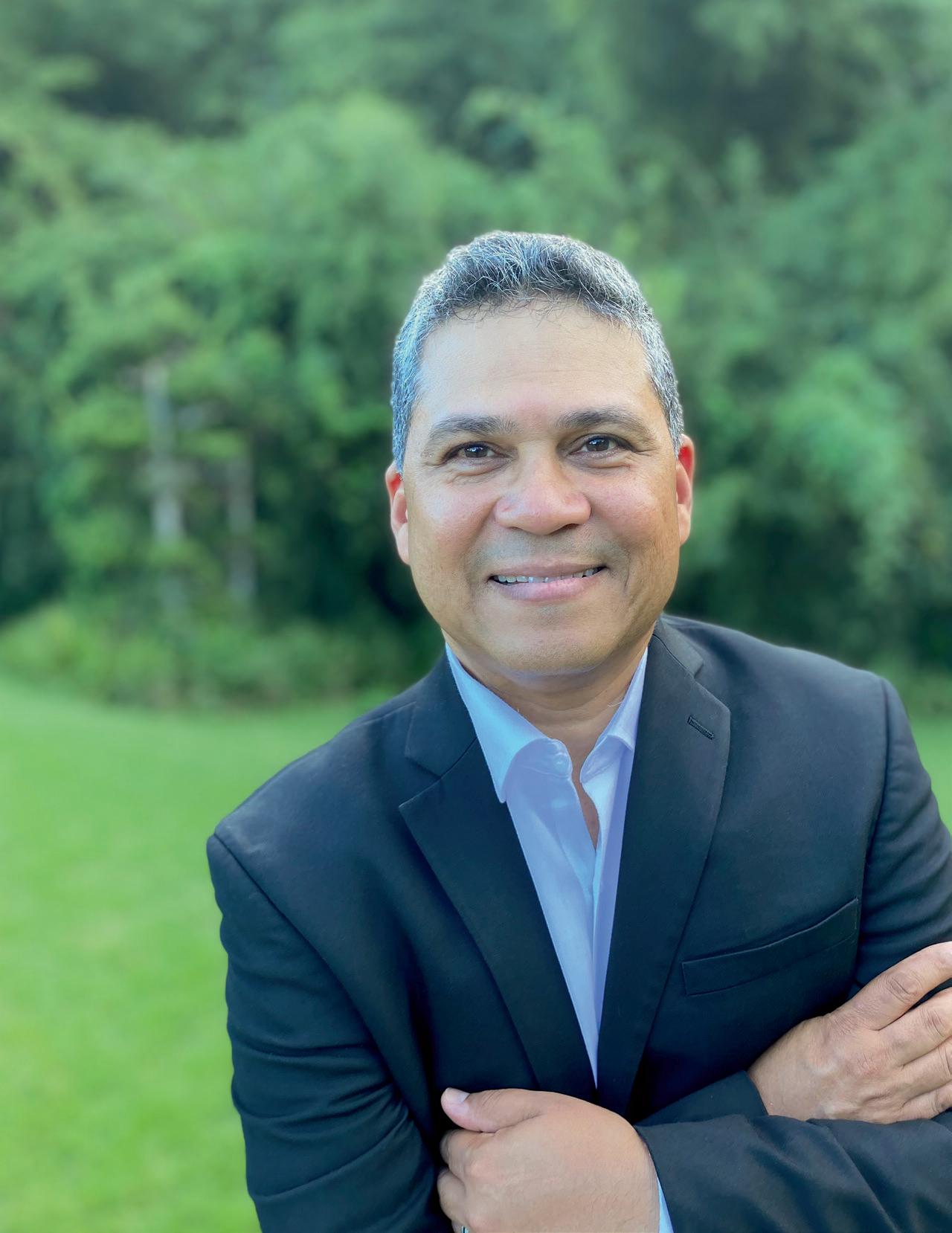
6 Caribbean Maritime | June-September 2023
PROFILE MARTIN MEDINA
Q. Where were you born?
A. Santo Domingo, Dominican Republic.
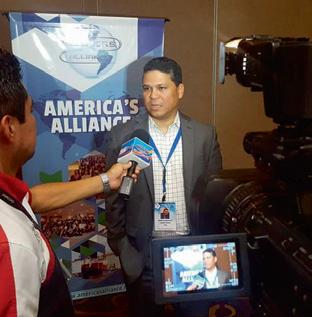
Q. What did your parents do for a living and what influence did they have on your early life?
A. My mother was a teacher; my father was regional manager for the country’s public electricity company. I have a mix of values from my parents: Catholic faith, love of the family, always to do the right thing, help others, give without expecting a return, respect women and appreciate music, travel, happiness.
Q. Where did you go to school?
A. In Santo Domingo, Dominican Republic
Q. What was it like growing up in Santo Domingo?
A. Seeing my parents go through a divorce and living with a single working mother made my brother and I realize the value of life and engagement. We had to be involved, work and do the best we could. My brother went to the US and joined the Marines and is still serving today. I stayed behind and held the fort.
Q. What about college or university? In what subject(s) did you graduate?
A. Marketing, with a diversity of extended programs afterwards. Then in my adult life, back in 2005, I achieved a Global Logistics Specialist designation at California State University, Long Beach.
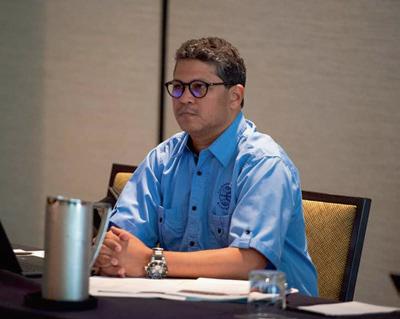

Q. What was your first job on leaving full-time education?
A. Right after high school, I worked for Sea-Land Service back in 1989 (Port of Rio Haina).
Q. What led you to join SeaLand Service in Santo Domingo and what was your role at the company?
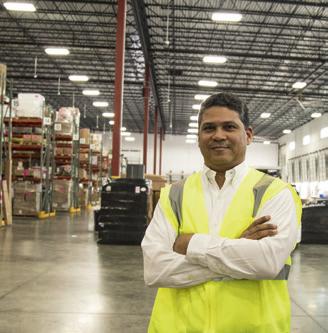
A. I was looking for better opportunities as I needed to provide more to my family. First role was in the maintenance department, then onto HR temporarily, and ultimately in sales management.
Q. In 1995 you moved to Maersk Line as sales manager in the Dominican Republic and, coincidently, some four years before Maersk would acquire your former employer SeaLand Service. What was behind your decision to change jobs?
A. The feeling of being exposed to a more global presence with Maersk. There I learned the five continents which was a huge benefit to my career in understanding global commerce.
Q. Were there big cultural differences between working for Maersk Line and SeaLand Service?
A. While it can be viewed differently, back in the day it was all about the Americas for me. Maersk was more global.
Q. You subsequently became the local general manager of Maersk Logistics charged with developing deep-sea LCL and FCL cargoes as well as airfreight, warehousing and customs brokerage. That’s an impressively broad portfolio. How did you manage to handle these various responsibilities?
A. I guess I always had a natural ability to multi-task. I was just doing sales in shipping. However, this ability was revealed more and more with time as I got closer to supply chain management, logistics flows and global commerce. That was really it – my capacity to multi-task, something every successful leader should have.
Q.When and why did you then move to Tropical Shipping?
7 www.caribbean-maritime.com
We had to be involved, work and do the best we could. My brother went to the US and joined the Marines and is still serving today. I stayed behind and held the fort.”
A. It was January 2005. I was looking for opportunities outside the Dominican Republic where I could use my success and apply them in new adventures. I am thankful as it happened as I envisioned it. We moved to Puerto Rico and then to Florida.
Q. After a couple of years of success in the Dominican Republic, in 2008, Tropical Shipping moved you to Puerto Rico where you became the carrier’s regional manager. How easy or difficult was it to adjust to living and working in San Juan and was this promotion a big step up for you?
A. It was easy in the sense of managing the staff because those guys – as they are today – are a great team, very motivated and self-driven which is something that makes any manager’s life easier. It was a significant move for me since it elevated my leading position from a single market management to a multiverse exposure having to manage new culture, customers with different business drives, and making new allies and friends. In terms of social and professional adjustment I can tell you that my family and I love the island and it was like a home away from home. We had a blast in Puerto Rico both workwise and personal.
Q. Following four years in San Juan, you took up a new position in Florida with leading NVOCC/Caribtrans Logistics. How did this move come about?
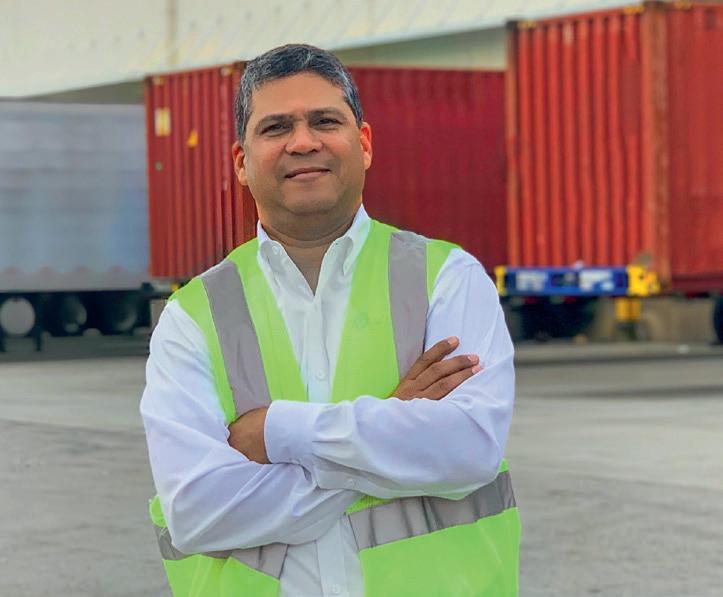
A. It reconnected me with my past life being an intermediary of services. From LCL consolidations, Full Loads, warehousing to air freight, among other support services, logistics operators are a different beast themselves and I felt very comfortable accepting this job as I had lived it before. I knew what the goals were
in managing Caribtrans and thankfully our teams have been able to take the company to new highs in the Caribbean and other areas we serve.
Q. This involved another location switch, a change of brand as well as a role change. How do you and your family adapt to moving?
A. In the past 16 years of my career, we have moved three times and this last move was not a big challenge for us personally. In the new role I was blessed to already know a lot of the folks I was going to interact with, so it did not become an issue adapting to it. We integrated well with each other, with everyone sharing their strengths and talents. That’s what makes a great team.
Q. Caribtrans has been owned by Tropical Shipping since 2008 and has served the Caribbean since 1985. What
are your current plans for this wellestablished company?
A. Someday I hope we can ship to the next habitat, the moon. Kidding aside –we have a lot to still do for the Caribbean and its citizens. We love the region, and we live in the region. Sometimes you don’t create new things but organically strengthen what you have and that makes a huge difference for your clients. The sky is the limit, but for now we love island life.
Q. Beyond work, what are your main interests and hobbies?
A. My family is my hobby, period. After that is travel, movies, reading, music, giving to the community and chicken wings.
Q. How often do you return to the Dominican Republic? What do you miss most about ‘home’?
A. At least once a year we would like to visit. I miss my family, the beaches and the food– rice, beans, and tostones (crispy fried plantain). I invite everyone to not only come to Punta Cana as a major tourist attraction but also to explore everyday life across the rest of the island.
8 Caribbean Maritime | June-September 2023 PROFILE MARTIN MEDINA
Sometimes you don’t create new things but organically strengthen what you have and that makes a huge difference for your clients”
Supporting the Region’s Training and Development
The Trust Fund, trading as the Frank Wellnitz Training and Wellness Initiative, was rebranded in honour of one the CSA’s Past Presidents, Frank Wellnitz who was instrumental in the establishment of the Fund and had a passion for education within the industry.
The CSATT was created to address, promote, encourage, train, educate, and assist in the advancement of persons especially in the Caribbean. This would be in all aspects of shipping practice to include maritime affairs, international trade, commerce, economics maritime/shipping, computerized technology, finance, and other related fields particularly in the Caribbean. The Trust Fund aims to provide training opportunities to individuals who are interested in pursuing careers in the shipping industry, as well as to existing employees who are seeking to upgrade their skills and knowledge.
One of the primary goals of the CSATT is to promote the development of the maritime industry in the Caribbean. This is achieved through the provision of training programs that are designed to meet the specific needs of the industry. These programs cover a range of areas, including
shipping operations, logistics, port management, and safety and security.
The CSATT works closely with industry stakeholders, including shipping companies, port authorities, and government agencies, to identify the specific training needs of the industry. This collaboration ensures that the training programs offered by the CSATT are relevant and up to date. The CSATTF has offered training courses to over 3,000 persons in the industry to date and we continue to look at ways and methods to upgrade these courses so that our workers remain on the cutting edge of technology.
Monica Silvera Scholarship
The Monica Silvera Scholarship was launched on January 26, 2005 and was established in honour of the late Monica Silvera, the CSA’s first female Executive Vice President, in recognition of her contribution to the development of the CSA. This scholarship supports studies at the Caribbean Maritime University in Kingston, Jamaica in the pursuance of a Bachelor of Science Degree in Maritime Studies. The CSATT also provides financial assistance to individuals who are unable to pay for training programs on their own.
This support is provided through scholarships and grants, which are awarded based on a range of criteria, including academic performance, financial need, and industry experience.
In addition to providing training and financial support, the CSATT also works to raise awareness about the importance of the shipping industry in the Caribbean. The organization participates in a range of industry events and initiatives and works to promote the benefits of a career in the maritime industry.
Over the years, the CSATT has played a key role in the development of the maritime industry in the Caribbean. The organization continues to provide training to various individuals and has helped to build a skilled workforce that is essential to the growth and success of the industry. Through its training programs, financial support, and industry advocacy, the CSATT is helping to build a skilled workforce that is essential to the growth and success of the industry.
Stephen Bell Caribbean Shipping Association Training Trust Fund
9 www.caribbean-maritime.com CSA TRAINING TRUST FUND
The Caribbean Shipping Association Training Trust Fund (CSATT) is a non-profit organization that was established in 1988 by the Caribbean Shipping Association (CSA) to support the training and development of personnel in the maritime industry in the Caribbean.
Cadets benefit from Trust Fund sponsorship
The Caribbean Shipping Association (CSA) is proud to support the training and development of the region’s future seafarers. To that end the CSA has been sponsoring several cadets attending the Caribbean Maritime University (CMU). Here are the stories of four of these cadets who have all benefitted from the CSA’s financial support during their time at CMU.
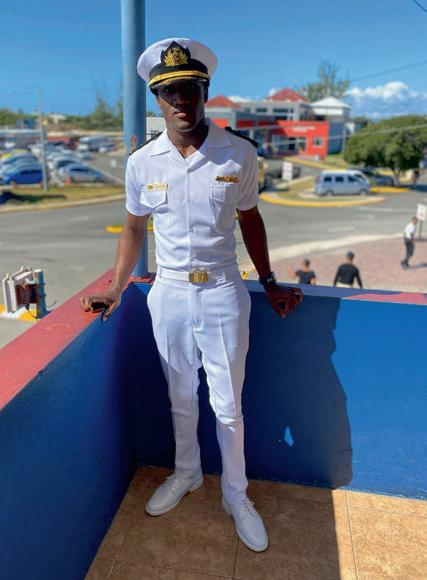
secondary education at Calabar Primary School and Calabar High School respectively.
Q. What first attracted you to the idea of studying at CMU and a subsequent career in the maritime sector?
A. I was drawn to the prospect of studying at CMU and pursuing a career in the maritime sector for several reasons. Firstly, my lifelong fascination with the sea and the art of ship manoeuvring, as well as the business of maritime transportation, led me to explore this field as a potential career path. The idea of contributing to the vital maritime industry through a career in marine transportation was particularly appealing to me.
Q. How important has your CSA scholarship been in terms of making it possible to attend CMU?
DELROY PATTERSON
Q. Where were you born and where did you grow up?
A. I was born in Rockfort, Kingston, and grew up in the Stony Hill area of St. Andrew.
Q. Please detail your education prior to attending CMU
A. Before commencing university studies, I obtained my primary and
A. The CSA scholarship has played a crucial role in enabling me to attend CMU. As a student, I am fully aware of the significant financial challenges that come with pursuing higher education.
The CSA scholarship has significantly reduced this burden and has provided me with the necessary financial support to attend CMU. This has enabled me to focus on my studies without being distracted by financial concerns.
In addition, the recognition and validation that come with receiving the
CSA scholarship have been personally rewarding. This recognition has instilled in me a sense of pride, responsibility, and a desire to give back to my community.
Q. What was your specialization at CMU?
A. My specialization at CMU is marine transportation.
Q. Upon graduation from CMU, what are your career plans?
A. I have a strong passion for marine transportation and ship manoeuvring, and I believe that my education and training at CMU have equipped me with the necessary skills and knowledge to succeed in this field. I plan to leverage my education, skills, and experience to secure a position as a marine pilot or officer, where I can apply my expertise to ensure the safe and efficient operation of ships.
Q. Would you encourage other young people to also look at CMU as an educational institution and to a career at sea?
A. As someone who is hoping to benefit greatly from my experience at CMU, I would surely encourage others to consider the institution as a valuable option for higher education in the maritime industry. One of the main advantages of attending CMU is the high-quality education and training that the university provides in the field of marine transportation.
10 Caribbean Maritime | June-September 2023 CSA TRAINING TRUST FUND
SHANE SALMON
Q. Where were you born and where did you grow up?
A. I was born in Montego Bay, Jamaica. I grew up in the community of Hendon, Norwood but later relocated to the community of Westgreen.
Q. Please detail your education prior to attending CMU.
A. I attended Cornwall College High School from 2008 to 2013, from grades seven to eleven.
After high school, I became employed at a Business Process Outsourcing teleperformance company for seven months before enrolling in the Caribbean Maritime University (CMU) later in 2014.
Q. What first attracted you to the idea of studying at CMU and a subsequent career in the maritime sector?
A. Initially I became interested in a career in the maritime sector due to a career day held while I was in ninth grade at high school in the year 2010. I remember it specifically. During this career day we had a number of professionals come in to speak with us.
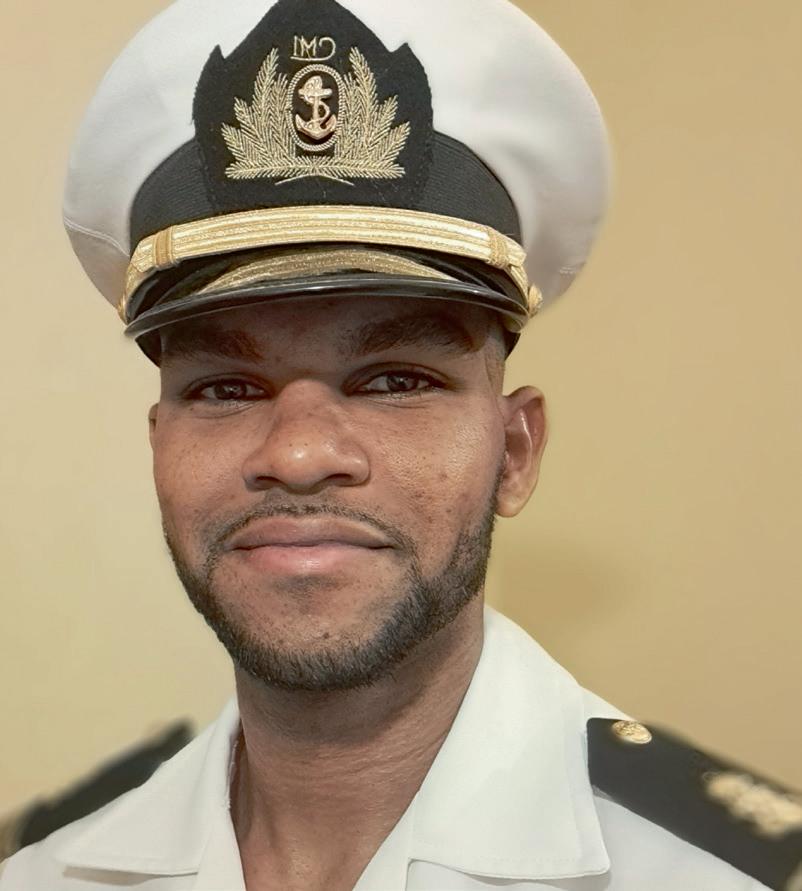
Q. How important has your CSA scholarship been in terms of making it possible to attend CMU?
A. Without question, the CSA scholarship has been instrumental in my time attending CMU especially in my first two years at the
University. In the early stages of my tertiary tenure, I had utilized the scholarship to cover the expenses of specialized training models called short courses. Since then, I have admired the work of the CSA and have been eternally grateful of the privilege that the Association has given to me.
Q. What was your specialization at CMU?
A. At the CMU I am enrolled in the Bachelor of Science Degree in marine and nautical sciences at the University’s Marine & Professional Studies faculty. It is a fouryear para-military comprehensive program that is grounded in theoretical as well as practical teachings.
Q. Upon graduation from CMU, what are your career plans?
A. My graduation date is set for November 2023 and afterwards it is my intention to continue my pursuits as a maritime professional. I did an apprenticeship of seven months with the Dutch shipping company Anthony Veder.
Q. Would you encourage other young people to also look at CMU as an educational institution and to a career at sea?
A. The CMU is indisputedly the best of its kind in the Caribbean region. Internationally recognized, the University offers a diverse selection of degrees and programmes. Since my enrolment in 2014 to date, it has been a privilege to see the growth of the University both in infrastructure and operations management.
11 www.caribbean-maritime.com
I have admired the work of the CSA and have been eternally grateful of the privilege that the Association has given to me”
ANDRE GORDON
Q. Where were you born and where did you grow up?
A. I was born in parish of St Andrew, but for most of my life I have lived in the small but busy town of Old Harbour in the parish of St. Catherine, Jamaica.
Q. Please detail your education prior to attending CMU.
A. Prior to CMU, I attended the Trafalgar Christian Preparatory School then the Wolmer's High School for Boys.
Q. What first attracted you to the idea of studying at CMU and a subsequent career in the maritime sector?
A. I was always fascinated with the world of traveling and experiencing new cultures. I am also a person who is very handson. The maritime sector was therefore something I saw as a good fit. I also like the feeling of responsibility and duty so working on a ship as a navigator would seem to fit perfectly with this.
Q. How important has your CSA scholarship been in terms of making it possible to attend CMU?
A. I received this scholarship towards the conclusion of the Covid-19 pandemic. Throughout that time, my family were facing great financial constraints. So, to me, this scholarship was [like] a helping hand to someone stuck in a deep well. This scholarship has allowed me to remain focused throughout my studies and not having to worry about if I will be able the complete a semester.
Q. What was your specialization at CMU?
A. Marine transportation/navigation
Q. Upon graduation from CMU, what are your career plans?
A. I am currently in the process of acquiring my Certificate of Competence as a navigator and my aim will be to continue focusing on this step of my career by acquiring sea time and completing the relevant examinations. Once this is achieved, a world of possibilities will be sure to open up.
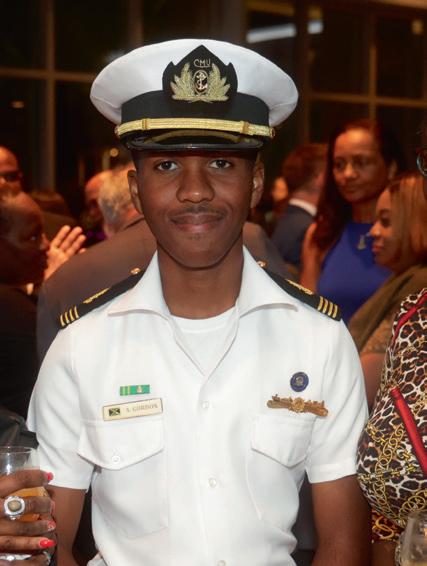
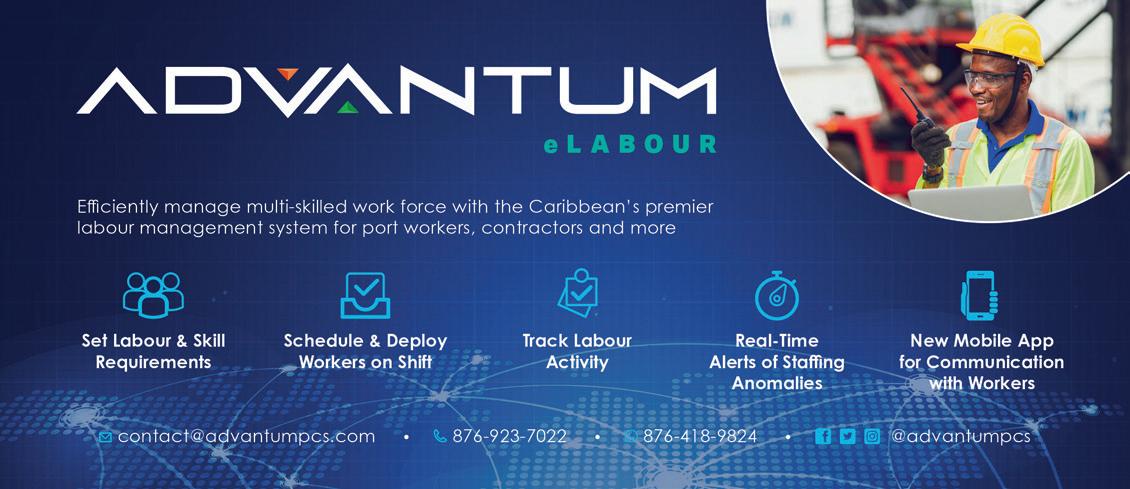
However, a career at sea will not be the end all for me as I hope in the future to be on land creating value for not only myself but for all who come around me.
Q. Would you encourage other young people to also look at CMU as an educational institution and to a career at sea?
A. I must say I have already started encouraging young people to look at a career at sea. I have been involved in multiple events hosted by the CMU to bring awareness to younger folks who are still out there searching for career opportunities. However, I want to always mention to these young persons that any career decision should not be made overnight but must be properly thought out with the relevant research.
CSA TRAINING TRUST FUND
Q. What did you gain from personally attending the 2022 CSA AGM in San Juan, Puerto Rico?
A. It was an experience of a lifetime. It provided me with an opportunity to step outside my comfort zone. It was my first time doing a presentation in the presence of so many people, so my mindset since then has been "If I can do this, what is there that I cannot do?".
I must say the conference also allowed me the opportunity to directly meet and network with maritime leaders and innovators across the region which has been very helpful in the development of my career.
SAIJEW BECKFORD
Q. Where were you born and where did you grow up?
A. I was born in Elderslie, St Elizabeth, and spent all my life growing up in my community Arcadia until I had to move away from my family to do studies at the University in Kingston, Jamaica.
Q. Please detail your education prior to attending CMU
A. Prior to attending CMU, I attended the Jointwood Preparatory School, then moved to the Glen Stuart Primary school and graduated to attend the Manchester High School where I spent five years of secondary education.
Q. What first attracted you to the idea of studying at CMU and a subsequent career in the maritime sector?
A. My initial attraction to CMU was the idea that it was the only university I had access to study marine engineering. I had developed a love for marine engineering since I was in 10th grade in high school, and I realized I was advanced at technical subjects such as mechanical engineering and technical drawing. I was always fascinated as to how this huge metal object could float on the water and I had to figure out how that was, also I was intrigued by the size of engines and different systems associated with marine vessels.
Q. How important has your CSA scholarship been in terms of making it possible to attend CMU?
A. I will forever be grateful to CSA for the investment they made in me. This scholarship has alleviated the pressure on my parents and allowed them to focus on my younger siblings. Also, the scholarship allowed me the opportunity to have successfully sat two examinations set by the Maritime Authority of Jamaica (MAJ). Also, with the help of the scholarship I completed 4 STCW certification.
Q. What was your specialization at CMU?
A. At the CMU, I specialize in marine engineering
Q. Upon graduation from CMU, what are your career plans?
A. Upon graduating I would like to work for a shipping company and utilize my skills and education in becoming the seafarer I know I am, aiming for the highest success. But as it relates to employment, I have no idea where I will start as job vacancies seem limited even with my qualifications.
Q. Would you encourage other young people to also look at CMU as an educational institution and to a career at sea?
A. Yes, I would recommend other youths to be a part of the CMU family and primarily aim for a career at sea because the degree is profitable and with a marine engineering degree and attaining a COC you have a lot of options for work – both offshore and onshore.
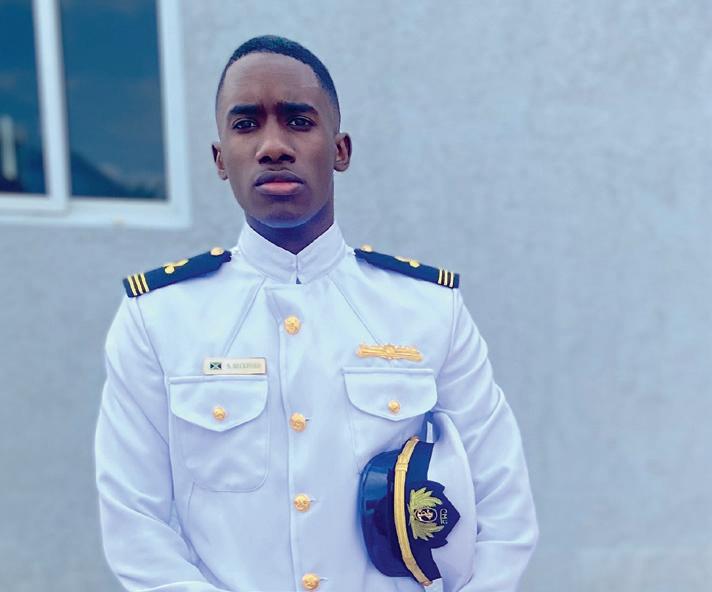
13 www.caribbean-maritime.com
I will forever be grateful to CSA for the investment they made in me. This scholarship has alleviated the pressure on my parents and allowed them to focus on my younger siblings”
The Region's maritime pathway to Decarbonization

14 Caribbean Maritime | June-September 2023
DECARBONIZATION
At the Caribbean Shipping Association’s Executives’ Conference (CSEC) in Fort Lauderdale in May, a panel discussion was held on decarbonization of shipping and port services in the Caribbean. Moderator and Principal Regional Energy Specialist at the Inter-American Development Bank (IDB) Roberto Aiello introduced the discussion by saying:
“There is strong momentum globally on this topic and the Caribbean region is no exception. The week before at the annual Caribbean Renewable Energy Forum (CREF) in Miami, energy stakeholders discussed the need to accelerate the pace of renewables at scale to cope, among other things, with the upcoming demand for green fuels, including for shipping and other sectors of the economy.
The International Maritime Organization’s (IMO) initial strategy on reduction of greenhouse gas (GHG) emissions from ships aims to reduce carbon intensity of international shipping by at least 40 per cent by 2030 compared to 2008; pursue efforts to achieve a 70 per cent reduction by 2050 compared to 2008; and reduce the total annual GHG emissions from international shipping by at least 50 percent by 2050. It also encourages countries to promote a transition to green ports.
Shipping and port services are of key importance to the Caribbean for logistics and trade. The maritime industry is a complex ecosystem that comprises various value chains, three of which are central for steering decarbonization actions: marine fuel, shipbuilding, and maritime operations.
On the energy side, the Caribbean region faces several challenges, including high energy prices, the lack of modern regulatory environments to attract private sector investments, and the increasing resiliency challenges due to the impacts of climate change.
Developing the building blocks to underpin a paradigm shift towards decarbonization of shipping and ports calls for integrated planning, analysis, and inclusive stakeholders’ engagement to develop the enabling ecosystem with a role for both the public and private sectors as well as for partnerships.
The panel were asked: what are some of the opportunities for decarbonization in shipping and ports?
Cherri-Ann Farquharson says: “Opportunities for decarbonization in shipping ranges from the electrification of smaller vessels used for shorter distances to the production of green hydrogen,

methanol, and ammonia from geothermal and offshore marine technologies for use in larger, longer-haul vessels. The production of green fuels for shipping is of particular interest. Several territories like Dominica and St Kitts and Nevis have the natural resources available to produce more energy than their current national demand and are actively pursuing Power to X industries to obtain off takers for the excess energy which they may produce”.
Ports may provide offshore and transit port refueling for vessels using green fuels or renewable energy powered charging for electric vessels. There are also extensive opportunities to decarbonize port operations with the use of renewable energy sources to supply electricity, electrifying or switching cranes and forklifts to greener fuels, and increasing the use of energy efficient technologies from low hanging fruit like lighting to cooling and plug loads.
Panelist Nelson Mojarro was asked: What scale and type alternative fuels are being considered by the shipping industry in their low carbon pathways?
Transition
The transition will not be easy and he put the sheer enormity of the task ahead in perspective. Saying: “The world will need an 18-fold increase of renewable energy to reach net-zero by 2050 (IEA). Shipping alone would require the equivalent of up to 3,000 TWH – the current world renewable energy generation – to produce low-carbon fuels (including hydrogen-based fuels) to decarbonize by 2050 (ICS 2022). The scale of the challenge is tremendous but also the opportunity for countries advancing towards net-zero.”
The panel also considered the ongoing thinking at the International Chamber of Shipping (ICS) regarding transitioning to low-carbon shipping and ports, and what actions are being taken?
“We have understood that shipowners’ efforts alone would not be enough to decarbonize. There is a clear acknowledgement of the need to develop a cross-sectoral approach, working with energy providers, ports, finance, shipowners, and
15 www.caribbean-maritime.com
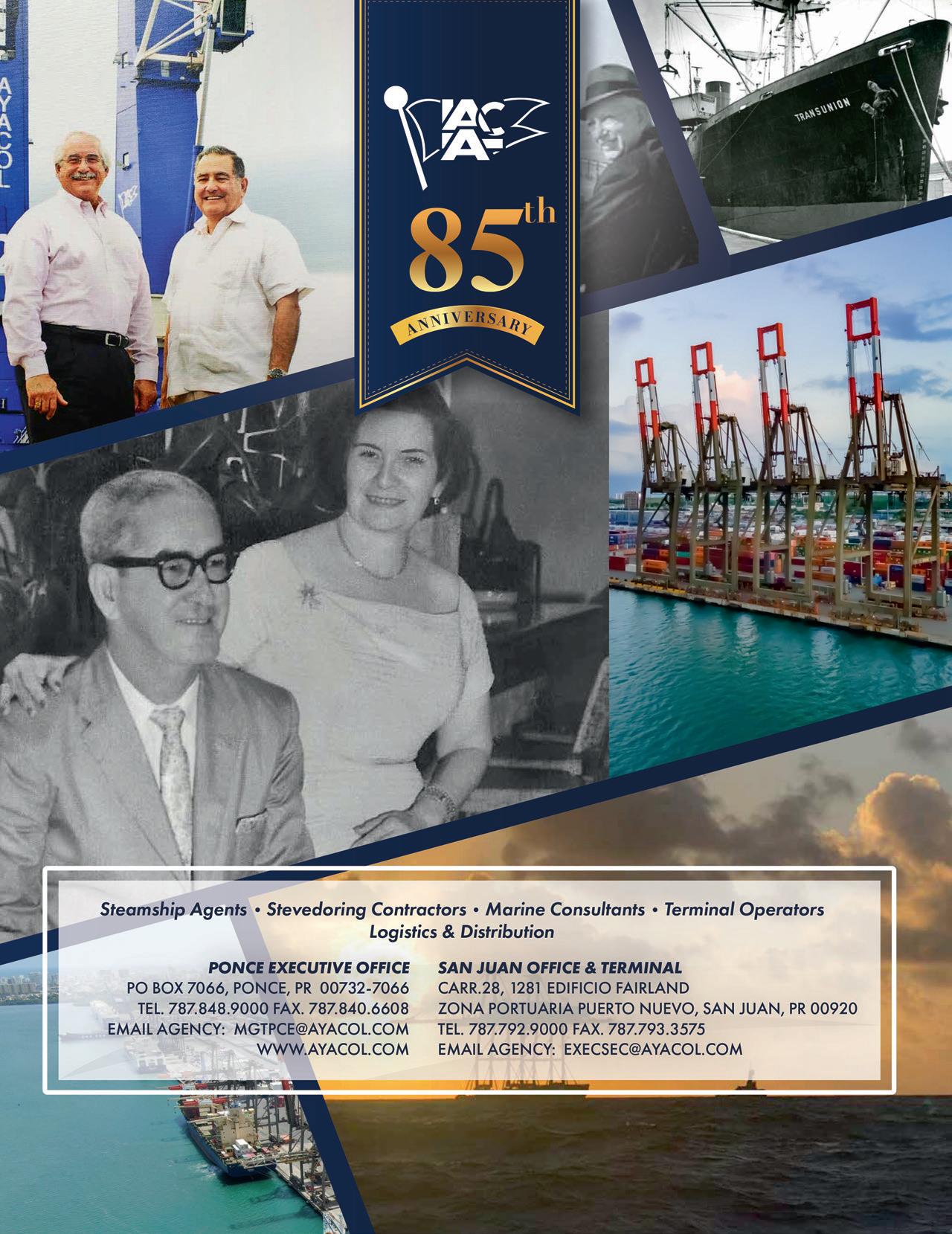
DECARBONIZATION
governments committed to facilitate the transition. Development partners such as the IDBG provide technical assistance and financing to foster decarbonization, commented Agustina Calatayud.
Having said that, ICS – representing 80% of the world’s fleet – in collaboration with the International Ports and Harbors (IAPH) and five initial governments (Canada, Norway, Panama, the UAE, and Uruguay) have developed the Clean Energy Marine Hubs initiative (CEM-Hubs), a global public-private partnership to increase the production of low-carbon fuels close to the ports and de-risk the investments required at scale.
In particular, Trinidad and Tobago’s Vivian Rambarath Parasram was asked about initiatives along these lines taking place in the Caribbean and the work at the Maritime Technology Cooperation Centre for the Caribbean (MTCC)?
Implementation
Ms Rambarath Parasram responded by saying: “MTCC Caribbean has been involved in the implementation of three major IMO projects aimed at progressing the decarbonization of the maritime sector. These projects include Phase 2 of the Global MTCC Network (GMN), IMO CARES and TEST Biofouling Project. The GMN project aims to facilitate continued capacity building in the CARIFORUM countries by working with the various maritime administrations and public and private sector stakeholders to mount pilot projects to demonstrate decarbonization opportunities. IMO CARES (Coordinated Actions to Reduce Emissions from Shipping) supports the work of the MTCCs and various IMO projects to accelerate demonstration of green technologies, consistent with blue economy principles. The TEST Biofouling project is being implemented in targeted
countries that include the six Latin American countries and two Caribbean countries. The objective is also capacity building to mitigate and reduce biofouling of vessel hulls with a view to reducing shipping emissions and promoting operational efficiency of the vessels.
Carleen Lyden Walker says: “Energy recovery from waste (e.g cruise lines) to turn their waste into energy to supply shore power would be an excellent way to create a ‘circular economy’ while mitigating impacts on landfills.”
In addition, the panel considered what needed to happen in the regulatory space to enable the transition to low carbon shipping in the Caribbean and what challenges would the region have to overcome to enable such a reform?
The region needs to have a harmonized approach to decarbonization as most

PANELISTS:
Caribbean countries do not have the trade volumes to justify the capital investments required by ports for renewable energy shore power systems. In addition, vessels that trade in the region are not necessarily owned and operated by Caribbean shipowners. Therefore, policies and regulations to be developed in cognizance of the unique challenges of the Caribbean’s maritime domain. Ideally Governments should enable capital investments through incentives to shipowners and ports and/ or pursue concessional financing for the development of resilient infrastructure though CARICOM. The regional approach needs to be coordinated and CARICOM provides an excellent regional institutional structure from which a regional policy and regulatory approach can be developed and harmonized.
• Cherri-Ann Farquharson, Capacity Development and Gender Expert, CCREEE
• Nelson Mojarro, Head of Innovation and Partnerships, International Chamber of Shipping
• Vivian Rambarath Parasram, Attorney specialized in Maritime Law, MTCC (Maritime Technology Cooperation Centre for the Caribbean)
• Carleen Lyden Walker, Co-Founder/CEO, IMO Goodwill Maritime Ambassador. North American Marine Environment Protection Association (NAMEPA)
• Agustina Calatayud, Head of transportation research, IDB
17 www.caribbean-maritime.com
Development partners such as the IDBG provide technical assistance and financing to foster decarbonization”
Shell launches landmark Caribbean LNG Bunkering
Given coordinated global efforts by the maritime sector to move away from its present reliance on traditional fuels in a drive to reach ambitious net zero emissions by 2050; it’s encouraging to see that the Caribbean now has its first Liquefied Natural Gas (LNG) bunkering hub, forming part of a worldwide network.
In March, Shell North America LNG and ZIM Integrated Shipping Services successfully bunkered the ZIM SAMMY OFER container vessel with lower carbon LNG. This vessel was bunkered at Kingston Freeport Terminal Ltd (KFTL) in Jamaica.
Tahir Faruqui, Shell’s General Manager, Global Downstream LNG, explained to CM why the landmark Kingston bunkering operation was so important, and he highlighted several key reasons: It was the first time a simultaneous operation (SIMOPS) was completed with LNG bunkering in Jamaican waters.
Kingston, Jamaica, is a new LNG bunkering location for Shell, expanding its global LNG bunkering network to 16 locations, across 11 countries. To date, Shell has already achieved over 1,000 safe ship-to-ship bunkering operations to its customers.
Dual-fuel
The ZIM SAMMY OFER is the first in a series of ten 15,000 TEU LNG dual-fuel containerships which ZIM plans to deploy on their ZCP trade line.

For these vessels, ZIM recently signed a ten-year marine LNG sales and purchase agreement with Shell.”
In this context, Mr. Faruqui sees the new LNG bunkering hub as part of a much wider plan by Shell to reduce global carbon emissions. “At Shell we support our shipping sector customers in realizing their decarbonization ambitions. The International Maritime Organization (IMO) has set a target to reduce the total
emissions from shipping by at least 50% by 2050 compared to 2008 levels, and carbon intensity by at least 40% by 2030, and 70% by 2050.
Target
Shell’s target is to be a net-zero emissions energy business by 2050, this includes both emissions from our own operations and emissions from the products we sell to customers.
Acknowledging that LNG is not the only solution in terms of low- or lowercarbon fuel as some carriers are betting on methanol or even green ammonia, Mr. Faruqui says: “The future of shipping will likely involve different parts of the sector using different fuels. This includes LNG which offers a credible pathway to start reducing emissions today.”
Adding: “At Shell, we recognize that in order to decarbonize the maritime sector, we need to consider a range of fuels, technologies and solutions such as LNG, biofuels, methanol and hydrogen-derived fuels. Shipping’s future will involve different parts of the sector using different fuels. We continue to work closely with key stakeholders in the sector to identify the best pathways to a net-zero future.”
Shell has worked closely with the Port Authority of Jamaica in setting up the new operation. Explaining the collaboration between the parties, Mark Regis, Country Chairman and Head of Corporate Relations, English and Dutch Caribbean, says: “The local maritime, port and customs authorities all played a key role in supporting this milestone opportunity to make Jamaica one of the region’s main LNG bunkering hubs.
18 Caribbean Maritime | June-September 2023
LNG BUNKERING
“Our recent collaboration with local authorities and ZIM not only enabled the safe SIMOPS bunkering operation at KFTL; but also expanded Shell’s LNG bunkering network to the Caribbean. With every new bunkering location added to our footprint, we are demonstrating the role for LNG as the lowest-carbon fuel available at scale today.”
Supported
The Maritime Authority of Jamaica (MAJ) has also supported Shell and ZIM in enabling LNG bunkering in Jamaica. “We are proud to be able to offer and

promote LNG bunkering in Jamaica,” says Rear Admiral Peter Brady, DirectorGeneral at MAJ. “Decarbonization of the shipping industry is critical and, being readily available today, LNG is a key part of the transition to lower-carbon marine fuels. This offering will not only grow local businesses but also encourage companies to embrace emissions reduction solutions.”
So, could Shell add further Caribbean LNG bunkering hubs? Answers Mr. Regis: “Shell remains open to supplying LNG to the Caribbean region. Our hope is that the recent offshore bunkering operation
in Jamaica signals the beginning of a larger regional transition to cleaner fuels, both for the maritime sector and other industries.”
At present, ZIM is Shell’s only customer in Jamaica, but Mr. Regis is optimistic about additional business. He says: “Shell remains open to supplying LNG to new customers in the region, in line with our global strategy to provide more and cleaner energy.”
19 www.caribbean-maritime.com
The Jamaica LNG bunkering hub is supplied with LNG by the 18,664 gt Avenir Achievement from Elba Island (Georgia).
The local maritime, port and customs authorities all played a key role in supporting this milestone opportunity to make Jamaica one of the region’s main LNG bunkering hubs”
A window of opportunities for Belize
As per the United Nations Centre for Trade Facilitation and Electronic Business (UN/CEFACT)
Recommendation No. 33, a Single Window (SW) is "a facility that allows parties involved in trade and transport to lodge standardized information and documents with a single-entry point to fulfil all import, export, and transit-related regulatory requirements. If information is electronic, then individual data elements should only be submitted once”.
In general terms, Single Windows are set up to facilitate the exchange of information between traders, and amongst government agencies, for procedures including obtaining permits and licenses, Customs clearance, port exit, certificates, and other necessary approvals. Accordingly, a SW offers a single point of entry and submission of relevant data for traders
and government agencies, and thus, a faster and more streamlined and paperless processing (United Nations Trade Facilitation Implementation Guide).
Contrary to mainstream belief, a SW is not predominantly an IT initiative, but rather a change management project. It involves several government agencies and other trade stakeholders, and, to varying degrees, always requires business process re-engineering. Thus, the establishment of a SW is foremost a political reform project.
Responses
The World Trade Organization (WTO) Trade Facilitation Agreement (TFA) encourages all its members to set up a SW (Article 10.4).
As part of economic policy responses to the COVID-19 pandemic, governments across the Americas, including the Government of Belize (GOBZ), have been paying special
Mona Swoboda M.A. Program Manager
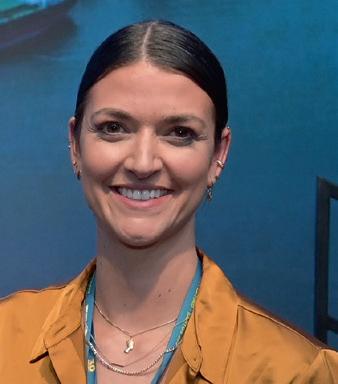
Organization of American States (OAS) Inter-American Committee on Ports (CIP)
attention to the export sector to build export supply capabilities and enhance capacity to compete in new markets. In line with GOBZ’s focus on boosting trade, Belize ratified the TFA on September 2, 2015, becoming one of the first countries to ratify the Agreement.
Since then, Belize has established a National Committee on Trade Facilitation (NCTF) which serves as the national coordination entity for the implementation of

BELIZE SINGLE WINDOW
20 Caribbean Maritime | June-September 2023
the TFA and is also a part of the CARICOM Regional Committee on Trade Facilitation. The chair of NCTF alternates between the Belize Directorate General of Foreign Trade (DGFT) and the Belize Customs & Excise Department.
Importantly, GOBZ developed the Trade Facilitation Implementation Plan and Roadmap (TFIPR), with technical assistance (TA) provided by the United Nations Conference on Trade and Development (UNCTAD), “to improve the domestic and international business competitiveness for trade in goods through simplification, harmonization, and modernization of export, import and transit processes thereby reducing export and import costs by 20 per cent and export and import time by 30 per cent by 2026.”
In line with the above, GOBZ has committed to establishing an Electronic Single Window (ESW) for trade. The ESW is expected to facilitate electronic transactions among traders, trade operators and agents, and trade-related government agencies, as well as to harmonize the data exchange and inter-operability among trade-related government agencies in the processing and issuing of trade licenses.
In this context, GOBZ has engaged the Secretariat of the Inter-American Committee on Ports (CIP) of the Organization of American States (OAS) in a TA project, financed by the Caribbean Development Bank (CDB), to conduct a Feasibility Study for the Establishment of an Electronic Single Window (ESW) for Trade. Launched in October 2022, the project informs and advises GOBZ on the technical, legal, and financial requirements for the establishment and operation of an ESW.
Recommendations
To this end, the CIP-OAS Secretariat, through coordinating a team of international trade experts, is conducting a study of successful practices in implementing Single Window Systems and will make recommendations on the practices most applicable to the Belizean trade
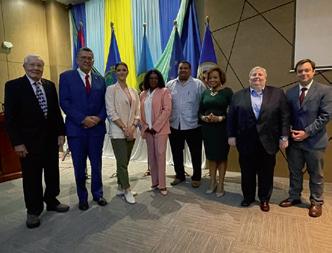
environment. Importantly, the TA project will deliver an analysis of the current system for conducting foreign trade transactions in Belize to provide support for achieving an increased level of efficiency.
In terms of a single window base model, Belize is well positioned to establish its ESW, as GOBZ has all the foundational legal authorities and preliminary guidance documents for developing the ESW. A robust risk-assessment program, paired with a coordinated institutional framework that promotes cross-agency coordination and systems integration, as well as strong high-level political will to ensure that government entities and private-sector actors work together effectively, will be at the center of GOBZ’s commitment to establishing its ESW.
Benefits
Once implemented effectively, the ESW will achieve significant benefits for all relevant trade stakeholders. Faster clearance times, a more predictable and transparent
process with less bureaucracy within the Single Window Environment will have a positive impact for trade operators. For trade-related government entities, greater efficiency in resource allocation, improved trade statistics, increase in revenue and staff productivity through the upgraded infrastructure are only a few of the many benefits from an ESW (United Nations Trade Facilitation Implementation Guide).
Importantly, for the national economy as a whole, governance transparency facilitated by the ESW can provide meaningful opportunities for economic growth in Belize.
MONA SWOBODA, MA
Mona Swoboda, MA, is Program Manager at the Organization of American States (OAS) Inter-American Committee on Ports (CIP), where she designs, implements, and manages high-impact port development programs and provides technical assistance to Member States. With special emphasis on an integrated port system, including logistics efficiency, security, disaster risk management, digitalization, as well as sustainable and inclusive policies, she creates synergies between international public and private industry leaders to facilitate the development of a competitive, resilient, and integrated port sector in the Western Hemisphere.
Mona graduated from Freie University of Berlin, Germany, with a Master's Degree in Interdisciplinary Latin American Studies with a Major in Sociology and Gender Studies, and a specialization in International Development. She holds a Double Major BA in Social Anthropology and North American Studies from WWU University Münster, Germany.
21 www.caribbean-maritime.com
Launched in October 2022, the project informs and advises GOBZ on the technical, legal, and financial requirements for the establishment and operation of an ESW”
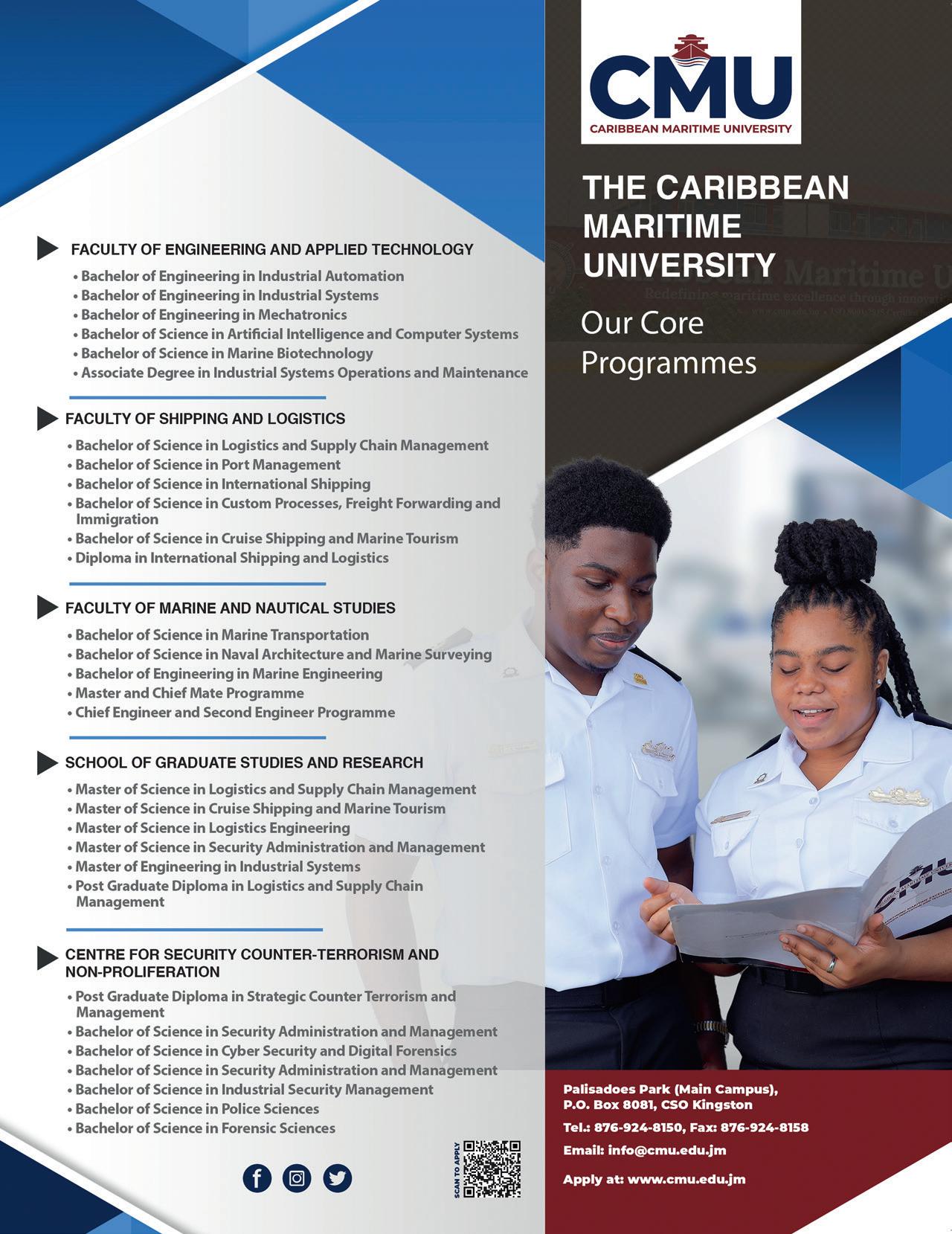
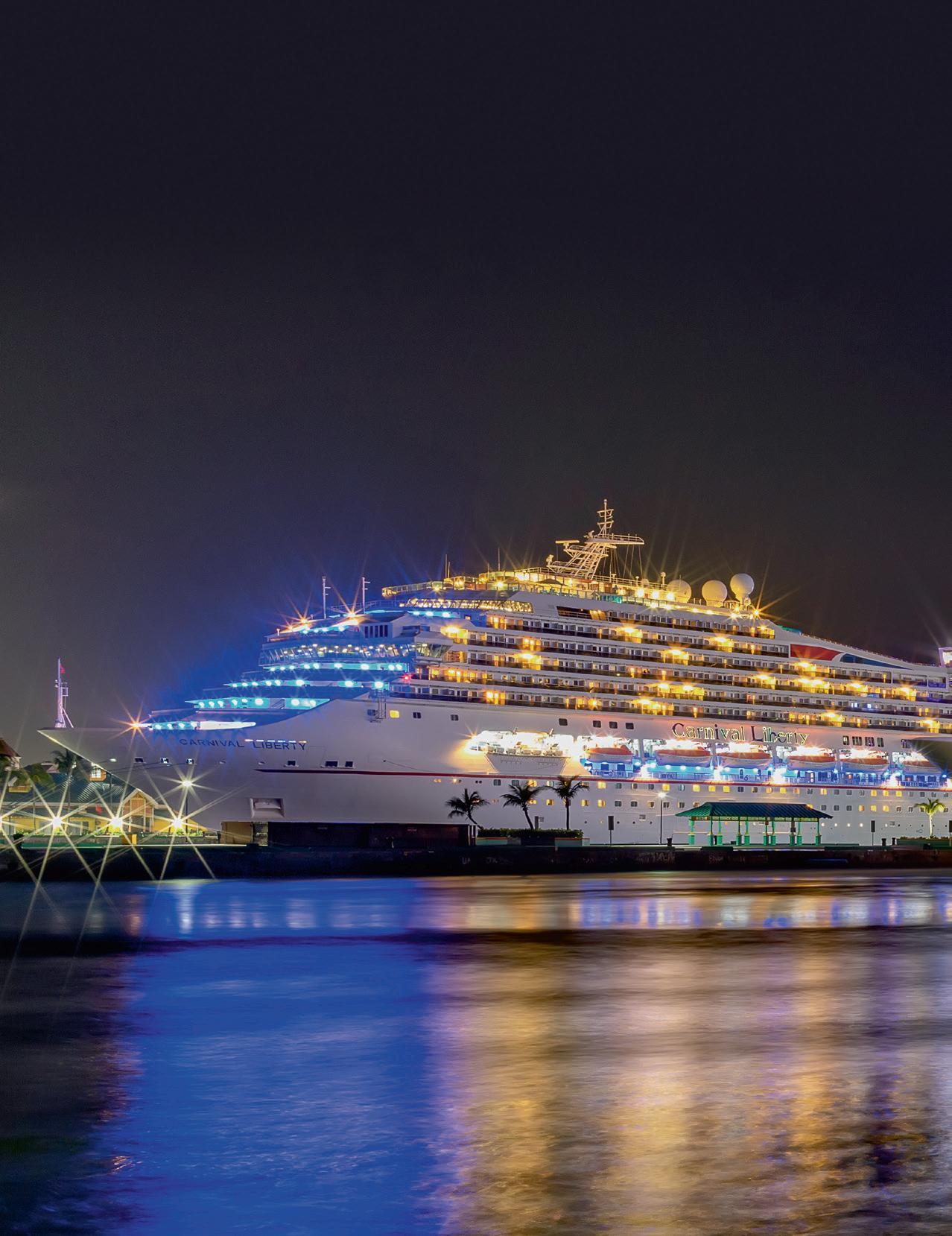
CMU formalizes partnerships with Carnival Cruise Line and the University of Guyana
23 www.caribbean-maritime.com THE CARIBBEAN MARITIME UNIVERSITY SeregaSibTravel / Shutterstock.com
New partnerships, plans and programs
THE CARIBBEAN MARITIME UNIVERSITY

Under the first of the MOUs, Carnival Cruise Lines has agreed that each year it will provide a specified number of internship opportunities for students of the CMU’s Faculty of Marine and Nautical Studies. The agreement underscores Carnival Cruise Line’s ongoing commitment to the professional development of its workforce and its investment in talent development within the Caribbean region.
The MOU makes possible traineeships of Marine Engineering Cadets and Marine Transportation Cadets and/or the reception of the selected cadets from both programs into full-time employment with CCL, among other opportunities within the Carnival Corporation. From this, students can obtain their 12 months of sea time as required by the STCW Convention, 1978.
CCL is one of the world’s largest and most popular cruise lines, with a fleet of over 100 ships and more than 150,000 employees worldwide. As part of the MOU, the CMU will provide Carnival with a steady stream of graduates who have completed a wide range of maritime programs, including navigation, engineering, logistics and hospitality.
The other MOU with the University of
Guyana (UG) will allow the CMU to access over 11,000 students to offer training and certification. The CMU’s areas of cooperation include joint programs, technical support, short professional course development, policy review and guidance, visiting professorships, and enterprise projects.

The two immediate tangibles from this MOU are:
1. An Advanced Certificate in Oil & Chemical Tanker Operations to be delivered on the campus of the UG, with virtual lectures by the CMU.
2. Combined grant fund applications for port, logistics and marine transportation analysis
The MOU between the University of Guyana and CMU is a win-win situation for both institutions. It will allow the University
of Guyana to expand its academic offerings while providing CMU access to a large pool of talented and motivated students.
The signing of these MOUs is a significant milestone for the CMU, which has established itself as a leading provider of maritime education and training in the region. The agreements with CCL and the
24 Caribbean Maritime | June-September 2023
Carnival Cruise Line (CCL) and the University of Guyana (UG) have signed separate Memoranda of Understanding (MOUs) with the Caribbean Maritime University (CMU). This move highlights the University’s commitment to providing quality maritime education and training.
The signing of these MOUs is a significant milestone for the CMU, which has established itself as a leading provider of maritime education and training in the region”
CMU’s President Professor Andrew Spencer (left) and Jamaica’s Minister of Tourism Edmund Bartlett
University of Guyana will enable the CMU to provide the industry with well-trained and certified seafarers while upskilling the workforce in Guyana. It also highlights the importance of collaboration between academic institutions and industry stakeholders in developing the next generation of maritime professionals.
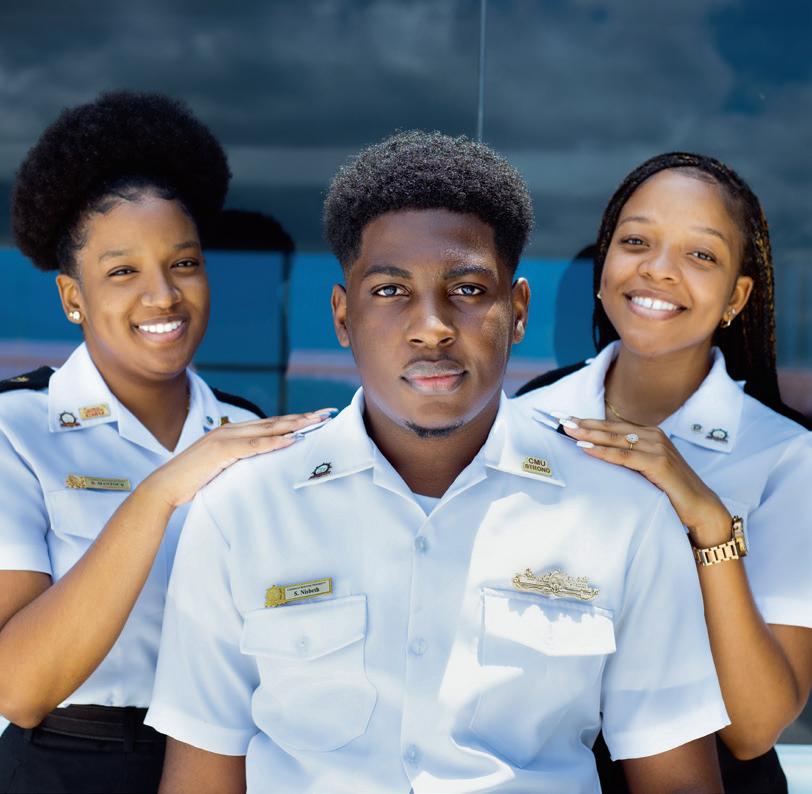
A new research-focused approach
The Caribbean Maritime University (CMU), through its Strategy, Growth and Innovation (SGI) Plan, has recently updated its mission statement, which now reads: "Redefining maritime excellence through education, research, and innovation," reflecting our promise to foster a research culture that promotes excellence. This new research initiative will feature staff and students, regardless of their research interests, generating new knowledge, identifying key solutions to critical challenges and contributing to the industry and economic development.
To accomplish this, our recently launched Research Implementation Committee at the CMU will organize workshops, seminars, and industry events that provide opportunities for everyone to engage with experts in the field, share research findings, and learn about the latest developments in the industry. We plan to provide tools, support, and opportunities for our staff and students to succeed in their research. These include a skills audit to determine essential skills and identify areas for further development, a Researcher Development Framework (RDF) to enhance the capacity to build the CMU workforce, academic promotion and workload policies, research policies, and training workshops.
We will also collaborate with industry practitioners and peer universities to promote joint research programs and reward individuals and interfaculty researchers for their research in thematic areas.
On our agenda is our Industry Conference, which is scheduled for September 28-29. The theme of the conference this year is “Managing Risks in the
Maritime Industry Through the Application of Engineering Solutions” and we are excited about this. Academicians and industry professionals have been invited to submit their research on various topics, which will initiate robust and stimulating discussions over two days.
The initiatives and research culture at the CMU will transform lives, industries, and economies and contribute to developing a sustainable and innovative maritime sector.
CMU - thought leaders on the blue economy
The Caribbean Maritime University (CMU) hosted its inaugural Port Royal Lecture Series on February 28, 2023, focusing on "The Blue Economy - Regeneration and Resilience." The event aimed to raise awareness of the importance of the oceans
to economies and the need for sustainable use of marine resources. As the seventh largest economy, the blue economy boasts an average of US$ 1.3 trillion annually.
Speakers included CMU President Professor Andrew Spencer, Jamaica’s Tourism Minister Edmund Bartlett; Ambassador Joachim Schmillen, Vice President of the CMU; Ambassador Olivier Guyonvarch, Ambassador of France to Jamaica and Permanent Representative to the International Seabed Authority and Minister without Portfolio in the Ministry of Economic Growth & Job Creation, Senator Matthew Samuda. The Caribbean relies heavily on the blue economy for its potential to increase economic growth and address issues such as unemployment, food shortages, and renewable energy sources. Each speaker emphasized the need to
25 www.caribbean-maritime.com
protect the oceans, address climate change and promote a sustainable blue economy through innovative and scalable solutions.
Professor Spencer conveyed that we must view the blue economy empirically, looking at data that helps us protect the marine space’s value. This becomes crucial against the backdrop of Sustainable Development Goal 14 – concern and sustainable use of the oceans, seas and marine resources for sustainable development.
In his keynote address, Minister Bartlett pointed out that those who harness the sea and marine resources need to take on greater moral responsibility to protect the fragile and gradually depleting systems that have become increasingly susceptible to artificial phenomena in their value chains. He stressed that tourism-related activities impose significant stress on coastal and marine ecosystems. Areas within which tourists visit have been under increasing pressure from the damage and pollution caused by tourist facilities and supporting infrastructure.
Samuda, in his presentation, stated, “The Jamaican ocean is significantly more valuable than the Jamaican land [and] the reality is, we have much work to do in a very short period if we are to leverage the value of our assets on land and at sea… we have to work that much faster if we’re to take advantage of the systems that we have.”
The second staging of the Port Royal Lecture Series will be on July 26.
MY DREAM INTO REALITY An Aspiring Marine Engineer’s Experience
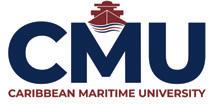
A marine engineer oversees the operation and thrust of a ship, ensuring the vessel moves safely from one port to the next.
I am Seychelle Bailey, an aspiring marine engineer who has completed my cadetship and is pursuing my Certificate of Competency license, allowing me to work on ships.
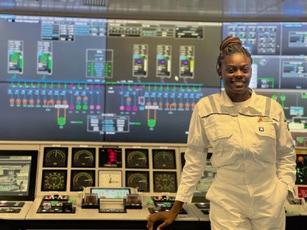
It has been a dream of mine since I discovered my passion for engineering and CMU. While at Jamaica’s Queen’s High School, I knew I wanted to do something “non-traditional”, so my decision to join this field was not hard. I must say that the maledominated field was a bit daunting, but I powered through.
That one decision to pursue my dream led me to make history. I am the first female Jamaican to be selected as a marine engineer officer aboard a Carnival Cruise Line vessel – the most popular cruise line in the industry.
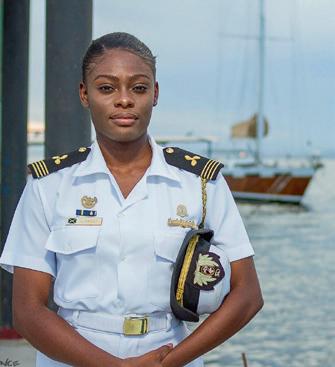
Being onboard the vessel was a phenomenal experience. I could put what I learned through CMU to practice and glean additional information that enhanced my skills and professionalism. It also allowed me to make family-like bonds. However, the experience was challenging because it had pros and cons.
One of the main things that stood out from this experience is that setting boundaries on the first encounter with your co-workers is
paramount, especially as a woman. The nature of our job and working environment is one in which we work and live in the same space. So, there need to be clear borders between work and leisure.
Another thing I recognized was the issue of bullying and harassment. I love that the International Maritime Organization has implemented initiatives encouraging victims to verbalize their problems without fear of discrimination. Far too often, seafarers are being bullied and harassed, and the offending party does not receive any consequences for their actions.
Mental health is essential, especially in a field like this. We are sometimes at sea for long periods, so this topic must be emphasized. This will help increase the number of women pursuing this career path.
The industry has much room to grow, and I am grateful to be a part of it. I know our leaders and aspiring candidates will help us bring more stability to the industry, and I look forward to working with them.
26 Caribbean Maritime | June-September 2023 THE CARIBBEAN MARITIME UNIVERSITY
Get in touch with the CMU The Caribbean Maritime University Email: info@cmu.edu.jm; 876-924-8150 www.cmu.edu.jm
Dominica’s Dr DoumbiaHenry bids for top role
World Maritime University president Cleopatra
Doumbia-Henry is bidding to be the new secretary general of the International Maritime Organization (IMO). Dr. Doumbia-Henry speaks to fellow Dominican and WiMAC president Tamara Lowe-James about her detailed plans for the IMO if she succeeds incumbent Kitack Lim on 18 July.
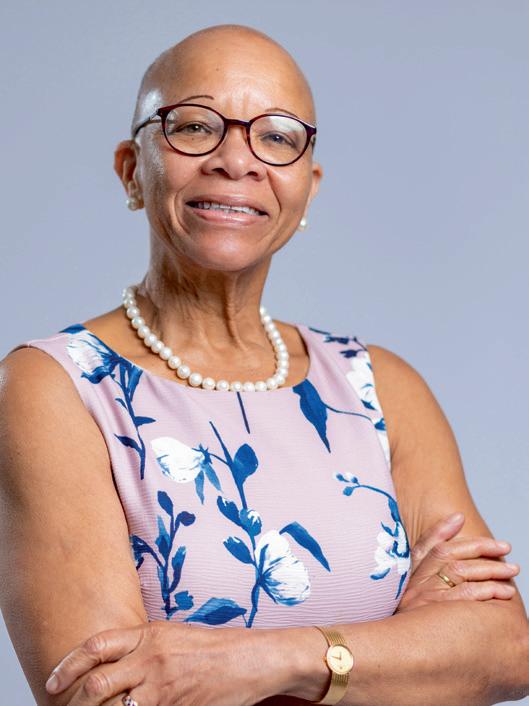
Q. What motivated you to apply for the position of IMO Secretary-General, and what do you hope to achieve in this role?
A. My motivation stems from the need for building on the substantive progress achieved by member States, former Secretaries-General, and global partners. I am committed to leading the Secretariat on a transformative trajectory that emphasizes human, environmental, economic, technological, and social values through effective global maritime diplomacy. As the UN Organization dedicated to maritime safety, security, and environmental protection of shipping, the IMO is uniquely positioned to advance this ambitious agenda and shape a sustainable and resilient future for the industry. At the epicentre of my intention lies that dedication.
To achieve what I have previously mentioned, I propose a transformative agenda focused on the nexus of
human-centric shipping, green shipping and smart shipping, fostering a balance between technological advancements, environmental sustainability and the wellbeing of maritime professionals for a more efficient, decarbonized, responsible and inclusive maritime sector.
Q. How do you plan to work with member states and stakeholders to promote the IMO's mission and objectives?
A. With reference to your question, the first point that comes to mind is “collaboration”. I will collaborate closely with member States, industry stakeholders, and international partners to ensure that the maritime sector remains inclusive, equitable, and creates opportunities for all.
The future of work in the maritime sector will be shaped by the intersection of technological advancements, environmental sustainability, as well as a focus on the
well-being and skill development of maritime professionals. As we navigate this rapidly evolving landscape, skills such as digital skills will become increasingly important for those working in the maritime sector. Data fluency, analytics, machine learning and computer literacy will be essential tools for our future maritime professionals as they contribute to the industry's progress and success. I will spearhead significant efforts to advance the related IMO instruments including the International Convention on Standards of Training, Certification, and Watchkeeping for Seafarers (STCW), ensuring its continued relevance and effectiveness in the maritime industry.
I will promote the sharing of best practices and the implementation of regulations and measures through effective regional cooperation, to address corruption, piracy against ships, substandard migrant transport, IUU Fishing, and other unlawful acts at sea.
27 www.caribbean-maritime.com WiMAC WOMEN IN MARITIME ASSOCIATION CARIBBEAN
I will lead, guide, motivate and inspire all Divisions and Departments of the Secretariat to ensure high level and excellent professional support for the work of the Organization and its member States. I will prioritize the development of a highly skilled, diverse, and motivated workforce that is supported by modern technology and tools. I will promote a culture of collaboration, transparency, and accountability to ensure that the Secretariat works closely with member States, industry stakeholders, and international partners to deliver on its mandate. By embracing innovative solutions and best practices, I will lead the Secretariat to continuously improve its performance, reinforcing its relevance in the global maritime community.
Q. In your view, what are the most pressing issues facing the maritime industry today, and how can the IMO address them?
A. I will need to keep evidence-based research by my side. Top world leaders turn to evidence-based research to seek pragmatic solutions.
Some of the pressing issues faced by the maritime industry include:
5 Geopolitical tension and the war in Ukraine;
5 Increase in fuel prices
5 Decarbonization and other environmental issues are seen as the most impactful;
5 Human sustainability and workforce shortages are areas of concern
5 Digital issues including cyber-attacks, which is something that has regretfully occurred at the IMO.
Q. How will you plan to address climate change issues impacted by the sector?
A. Climate change has already begun to leave a tangible impact on our lives, and addressing this issue is a pressing global priority. The IMO will need to strategize to ensure member states remain climate resilient.
A resilient maritime sector is one that is equipped to withstand and adapt to changing conditions and recover positively from shocks and stresses, whether they be related to climate hazards, geopolitical
uncertainty, technological change, decarbonization efforts, or other unforeseen disruptors. A resilient maritime sector requires coordinated actions and transformation across all systems, from vessel and cargo owners to downstream logistics providers.
Q. How do you plan to address the challenges posed by emerging technologies, such as autonomous vessels and digitalization?
A. Digital technologies are opening up unlimited possibilities. We are now in the fourth industrial revolution, and we must look into how to unleash the full potentials of emerging technologies by removing the challenges. What are those challenges? Traditional regulatory structures are complex, fragmented, risk-averse, and adjust slowly to shifting social circumstances, with various public agencies having overlapping authority.
There are three key challenges in regulating emerging technologies: (i) the unpredictable nature of business
Women in Maritime
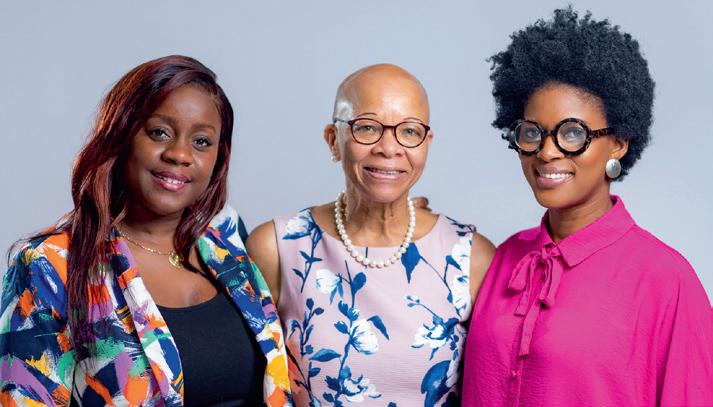
models that rely on emerging technologies; (ii) privacy, security, ownership, and control; and (iii) the Artificial Intelligence conundrum.
Q. Finally, what message would you like to convey to member states and stakeholders about your candidacy for the IMO Secretary-General position?
A. We stand at the tipping point of a transformative era for the maritime sector. Consequently, fostering global consensus for a sustainable and resilient future is more critical than ever before.
The Secretary-General is the most powerful office in the maritime world. Through its leadership, can come a more vital life for the maritime nations, for the stakeholders and for all who are involved. In it are centred the hopes of the people dependent on the oceans, the countries whose economic pillar is reliant on maritime and shipping. It is in the IMO that the most crucial decisions of this century must be made in the next four years.
Over the last twenty years there has been a significant increase in the role of women in the maritime sector occupying senior positions. It is also interesting to note that a number of women today are not only running maritime operations and administrations but are also shipowners themselves. As Secretary General, I will continue to encourage and empower women enabling them to build their capacity to engage in maritime affairs at all levels. I would also mobilize and provide support for their networks to enable them to achieve their goals and objectives including gender equality in the industry.
28 Caribbean Maritime | June-September 2023
WOMEN IN
WiMAC
MARITIME ASSOCIATION CARIBBEAN
(Center) - Dr. Cleopatra Doumbia-Henry, (right) - Tamara Lowe-James, President of WiMAC, (left) - Carlita Benjamin - President of WiMAC/Dominica Chapter
Caribbean Maritime
history
Stories from maritime's past: National Shipping of America
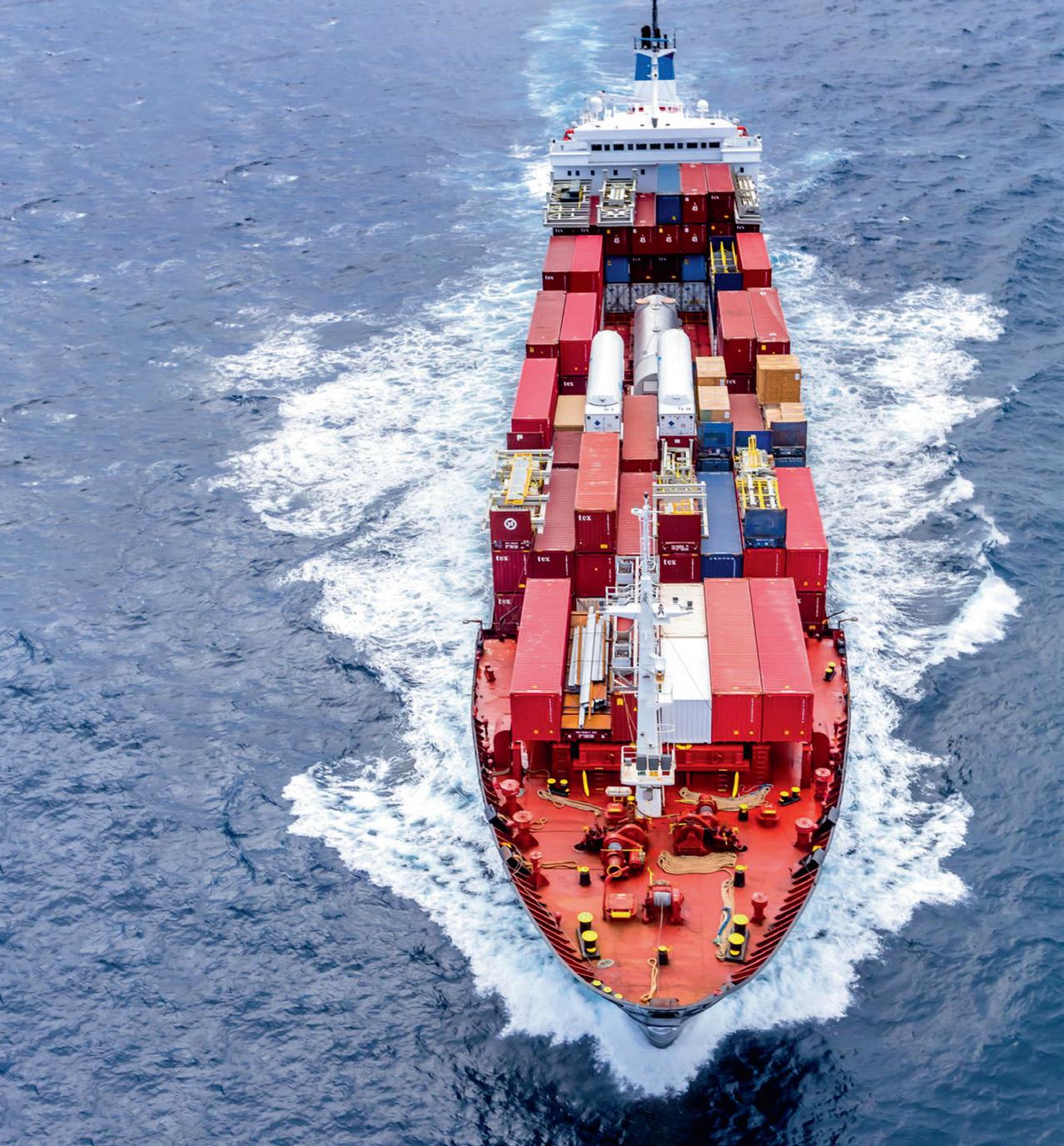 by Gary Gimson
by Gary Gimson
From time-to-time Caribbean Maritime includes a history of a shipping company, a maritime trade, an event or even just a notable ship. As part of this occasional series, this issue of magazine visits a comparatively recent maritime history. This is the compelling story of National Shipping of America –a company that endured its fair share of tough times.
29 www.caribbean-maritime.com
A decadelong roller coaster ride
National Shipping of America is celebrating its 10th year serving Puerto Rico from the US. Yet the San Francisco-headquartered carrier has taken a somewhat unconventional path for its entry into this Jones Act trade.
The company’s first vessel, the National Glory (formerly named ‘Yalta’) was a 1988-built, 11,652 gt general cargo ship when it was arrested and seized for carrying contraband by the US Government.
National Shipping then purchased the Yalta for US$ 2.7 million at a Tampa Court auction and registered the vessel in the US thereby gaining the ‘coastwise endorsement’ to operate in the Jones Act trades.

Converted
Recognizing that a general cargo ship was far from economical under the US flag, National Shipping converted the vessel into a small container ship. The National Glory was built in Poland, not the US which, of course, is a key Jones Act requirement which only has a very few exceptions – one being the Forfeiture Act sale. The other exception is a ‘salvage vessel’ performed in US waters.
Explains president Torey Presti: “In 2004 this vessel came up for auction knowing it came with Jones Act trading privileges, but we did not know where the National Glory would fit. So, we traded her as a
US-flag vessel in the foreign trades until 2013 when we saw an opening with the departure of Horizon lines from Puerto Rico. Houston was left without a service, and we jumped in.”
So, with the prompting of a large Houston-based beverage exporter, National Shipping launched a service to Puerto Rico in May 2013. The shipping line experienced an immediate ‘baptism of fire’ as it was in direct competition with long incumbent Charlotte, North Carolina-based Horizon Lines – at that time the largest Jones Act compliant shipping and logistics company, accounting for around 37 per cent of all US container shipments between the continental United States to Alaska, Hawaii and Puerto Rico.
HISTORY: NATIONAL SHIPPING OF AMERICA
30 Caribbean Maritime | June-September 2023
Sailing at less than 50% capacity had made for a painful first 15 months for National Shipping’s new Houston-Puerto operation. But this is where the company was fortunate in having an owner that is well versed and experienced in the shipping industry”
New markets
at a cost of US$2.2M. All vessel improvements contribute to extending the vessel’s life.
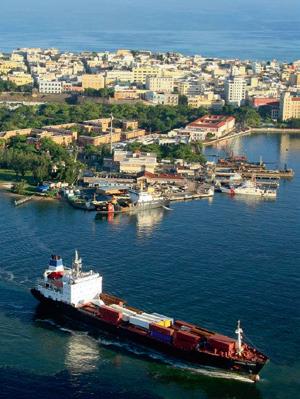
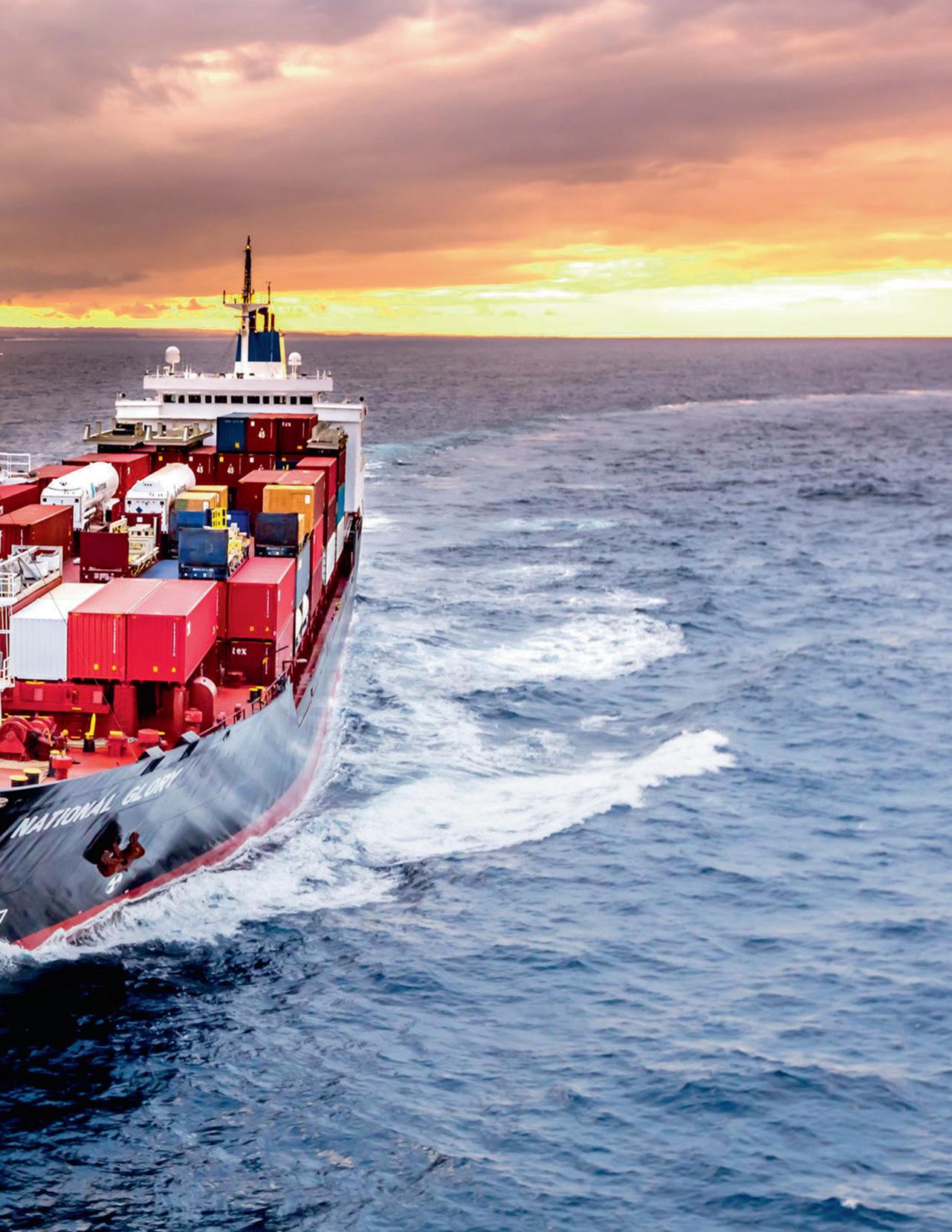
Shoreside, National Shipping has invested in a new systems platform to manage its customer service and back office/documentation processes. The new system will improve efficiencies for both the shipper and carrier. The new platform has been customized with specific Puerto Rico applications. The plan is to phase in the new system during 2023.
In 2021 National Shipping established a new southbound call in Port Everglades. This opened two new markets. The first is what is known as the M-10 of the American Marine Highway – Houston to Port Everglades. The program sponsored by the Maritime Administration promotes Houston to Port Everglades via sea versus the traditional truck service. The economic, environmental, and social issues are compelling to take trucks off the road. Secondly, the South Florida call enabled National Shipping to offer direct, fast service to San Juan. Each week, the carrier sails on Sunday and arrives in San Juan Wednesday morning.
Unfortunately, 2022 was a retrenching year. The company’s vessel underwent an expensive drydock to meet the changes mandated by the International Maritime Organization (IMO) –mostly emission standards and ocean-preservation initiatives. The scrutiny by the regulatory bodies increased for older vessels since the El Faro casualty. National Shipping invested in new hatch covers for the National Glory
National Shipping’s goal is to provide uninterrupted service from its main load centers in Houston and Port Everglades. National Shipping recognizes Houston as a key market for Puerto Rico as it relates to industrial chemicals, plastics, and beverages. As a long-time supplier of energy, Houston is becoming a major source of power transmission and distribution equipment for Puerto Rico.
Another strategic feature is Houston’s proximity to the Mexico border. After the supply chain meltdown, large US importers are adapting a ‘near sourcing’ strategy to bring manufacturing closer to consumption. Investment in the border trade is a bright spot. Located in the Rio Grande Valley, Texas produce is second only to California. Products like onions, oranges and peppers are just a few items that are being regularly exported to Puerto Rico.
Houston remains a strategic port for Puerto Rico for any cargo originating west of the Mississippi. By eliminating close to 1,000 inland miles stateside, the Houston gateway provides economic and environmental advantages for select cargoes.
31 www.caribbean-maritime.com
HISTORY: NATIONAL SHIPPING OF AMERICA
Despite Horizon Line’s size and huge market share, National Shipping firmly believed that the operator’s days were numbered. So, it came as no surprise when Matson Navigation purchased Horizon Lines at the end of 2014 and quickly ceasing operations to Puerto Rico. Clearly, Matson only wanted Horizon’s Alaska service. Sailing at less than 50% capacity had made for a painful first 15 months for
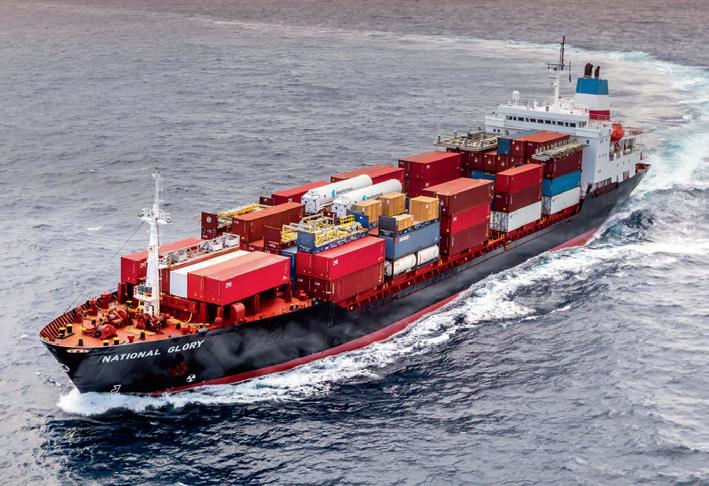
National Shipping’s new Houston-Puerto operation. But this is where the company was fortunate in having an owner that is well versed and experienced in the shipping industry – Dr C.C. Chen. More noteworthy is that Dr Chen founded Wan Hai Lines in 1965, now the world’s 11th largest container carrier. Dr Chen understood shipping cycles and its capital requirements to start and sustain a service.
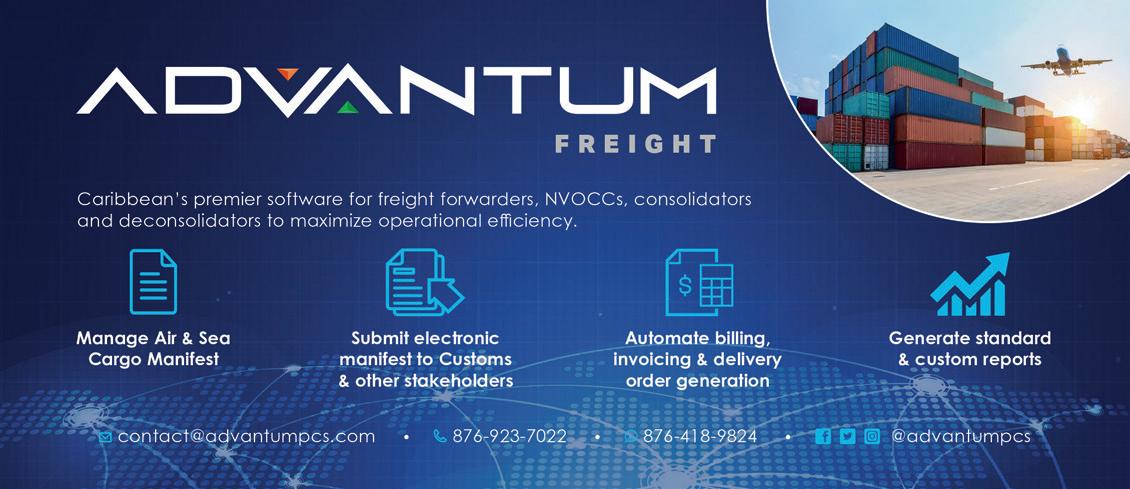
In the 10 years that have ensued since its formation Mr Presti admits that the company has experienced were nothing short of a decade-long roller coaster ride. Awakening to learn of the sad loss of the 31,515 gt ro/ro vessel El Faro in October 2015 during Hurricane Joaquin was by far the most shocking and deeply felt. In 2017 the fierce impact of Hurricane Maria so devastated Puerto Rico that it has not yet fully recovered. There were two more hurricanes within two weeks of Maria that struck both Texas and Florida all within National Shipping’s trade route.
Covid-19
These natural disasters were followed by the onset of Covid-19 in early 2020. As Mr Presti acknowledges: “Our lives changed almost immediately, and we were required to adapt to a new life coping with the virus. Broken supply chains and inflation increased all our costs across the board.”
But in between all these disasters, the National Glory made three successful rescues of Cuban refugees.
Mr Presti sums up the 10 years. Roller Coaster? It was more like going nine rounds in the ring!”
The 21st Caribbean Shipping Executives’ Conference in Fort Lauderdale, Florida
CSEC 2023 highlights
Almost 300 maritime delegates converged in Fort Lauderdale, Florida to plot the industry’s future at the 21st Caribbean Shipping Executives’ Conference (CSEC) which began on May 1.

The two-day event is the Caribbean Shipping Association’s (CSA) mid-year conference and was staged, through partnership with Port Everglades, at The Westin Fort Lauderdale Beach Resort.
President of the CSA, Marc Sampson, in his opening address, said the conference provides an opportunity for industry members to engage in productive discussions that will address the challenges faced, identify opportunities for
growth and development, and strengthen networks and partnerships.
Sampson said the CSEC focus areas are reflective of the prevailing circumstances within the shipping and logistics industry. These included decarbonization, paperless processes, cybersecurity and data protection, payment simplification, the cruise industry’s outlook and the maritime supply chain, among others.
The keynote address was delivered by Simon Cohen, founder and chief executive officer of Henco Logistics, who spoke on the topic “Happy Performance, Happy People”. Following a health scare, he encouraged attendees to ensure that in times of crises, they should safeguard relationships with
their family and friends and protect their physical well-being.
The conference’s sponsors were Kingston Wharves Limited, Boskalis, TOTE Maritime, SVITZER, Shipco Transport, Tropical Shipping, King Ocean Services, Manzanillo International Terminal, Caribbean Consolidated Express, Tideworks Technology, Luis A Ayala Colon, Seaboard Marine and Maritime and Transport Services Limited.
The Association will stage its next meeting in Port of Spain, Trinidad and Tobago from October 23-24, 2023.
On the following pages Caribbean Maritime shares highlights of the vibrant gathering with its readers.
CSA CSEC 2023 33 www.caribbean-maritime.com

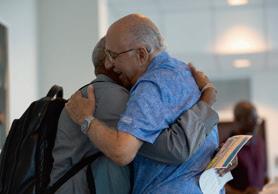
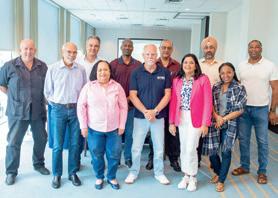
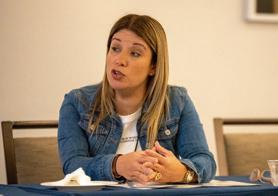

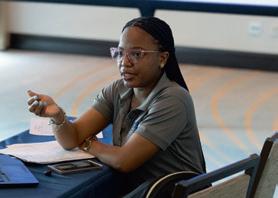

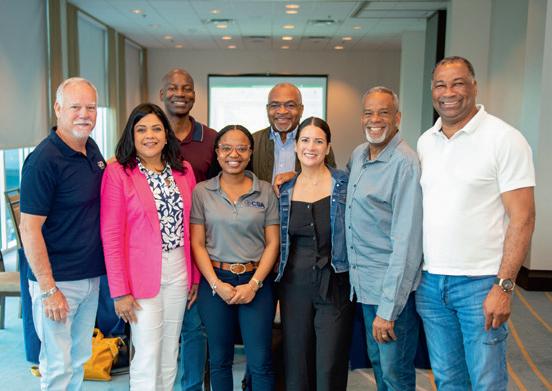

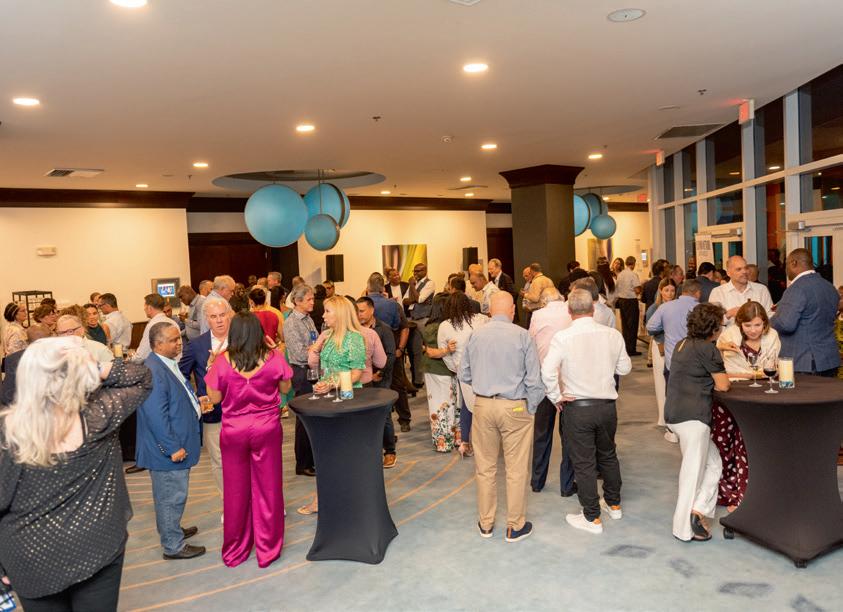
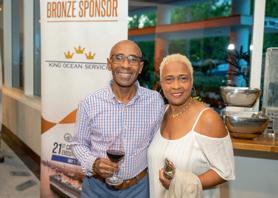
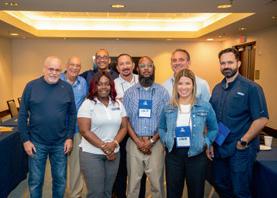
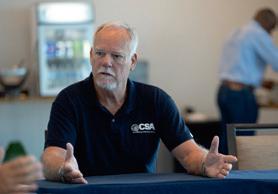
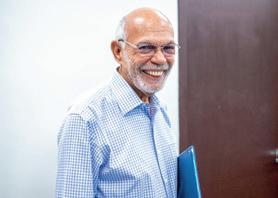
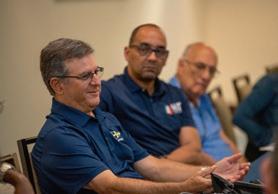
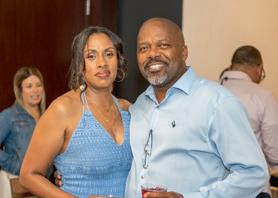
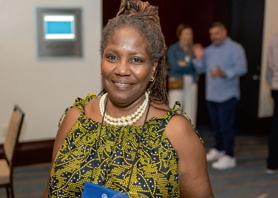
CSA CSEC 2023 34 Caribbean Maritime | June-September 2023
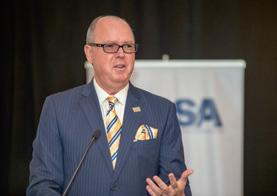


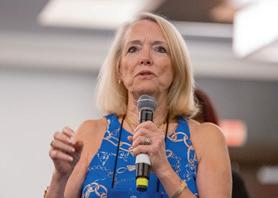
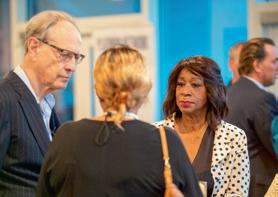
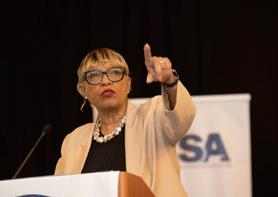
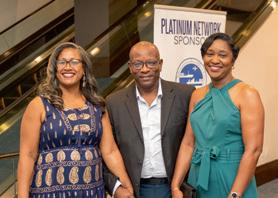
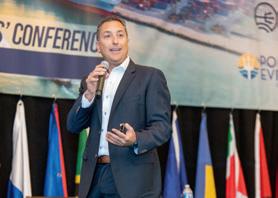
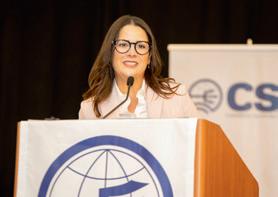

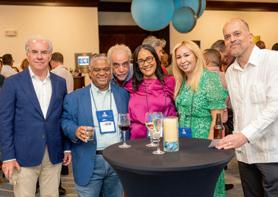
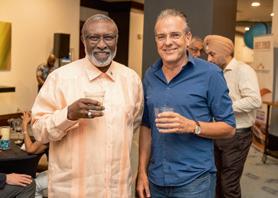
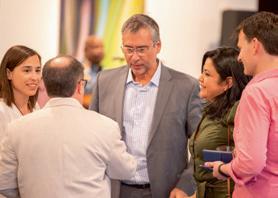
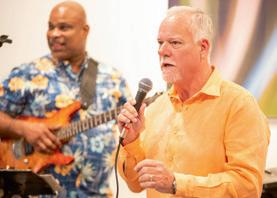
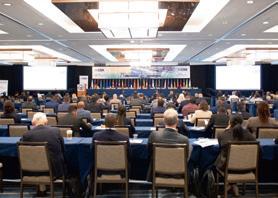
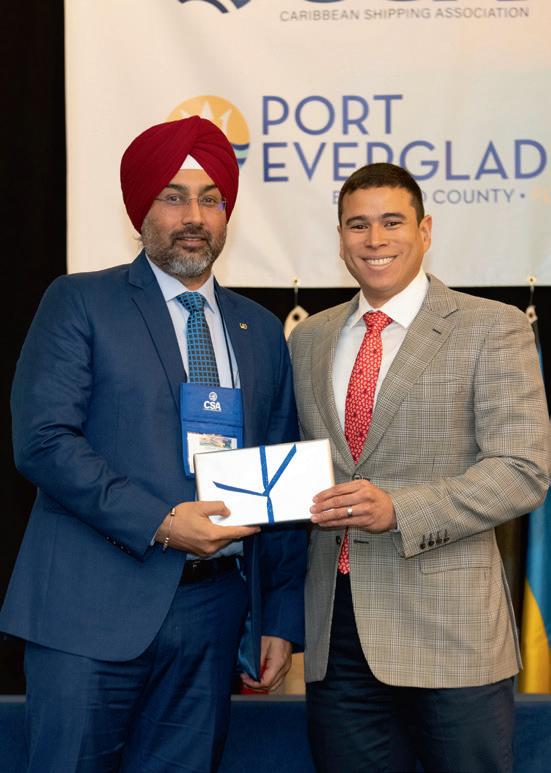

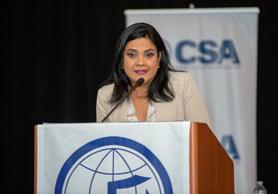

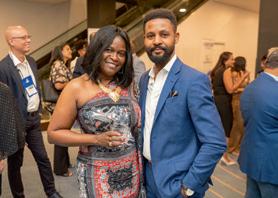
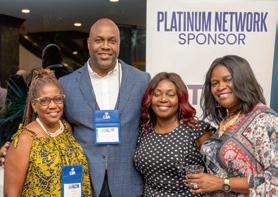
35 www.caribbean-maritime.com
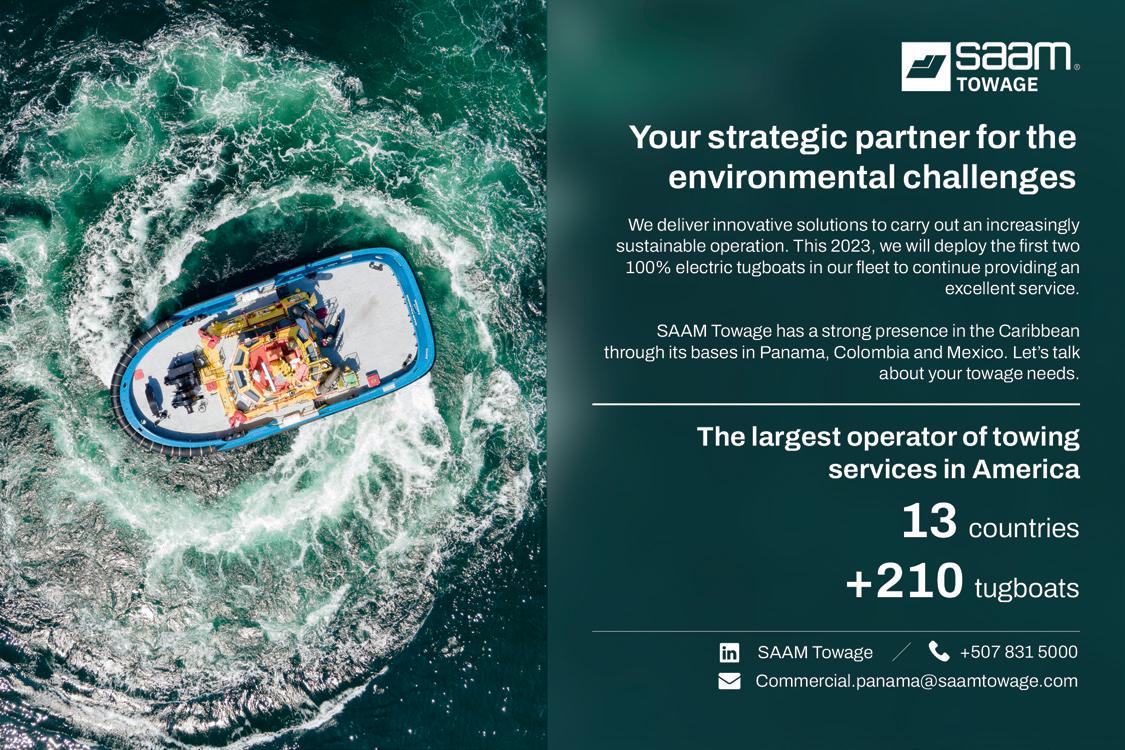
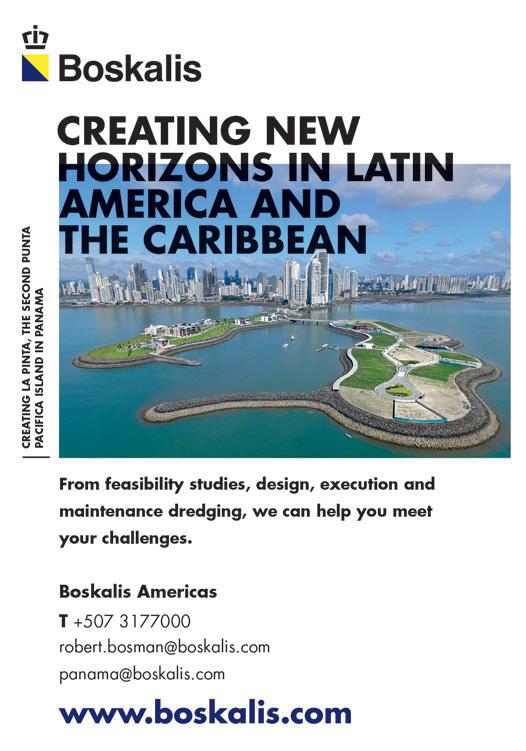
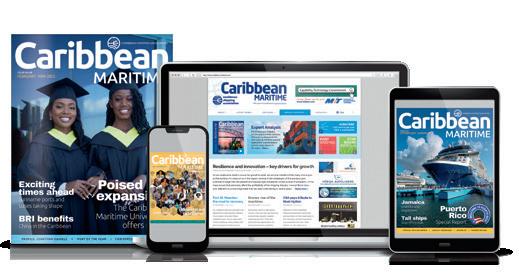
Stay up-to-date with Caribbean Maritime online, official journal of the CSA, download from www.caribbean-maritime.com, read on mobile or tablet and keep in touch on social media. CaribbeanMaritimeMagazine cm_magazine @caribbeanmaritimemagazine www.caribbean-maritime.com FOLLOW US ONLINE

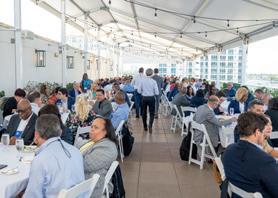
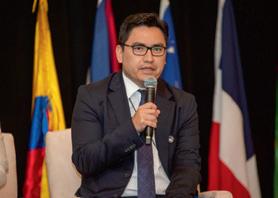
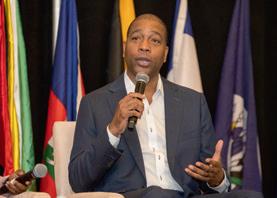
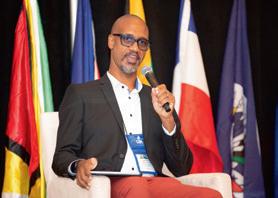
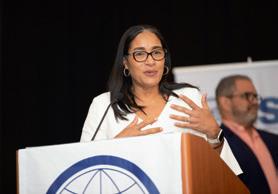



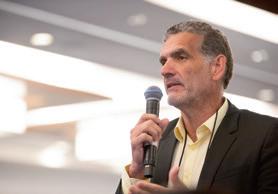

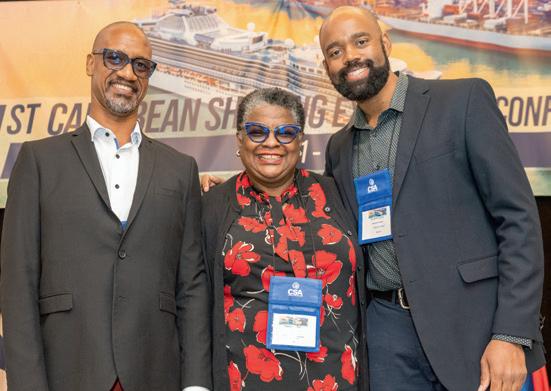
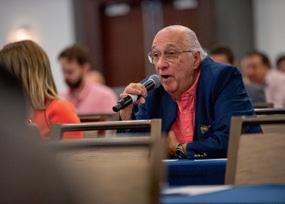

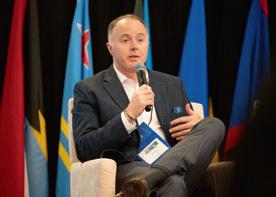
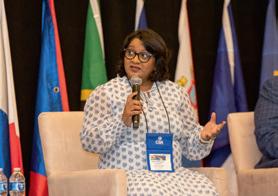
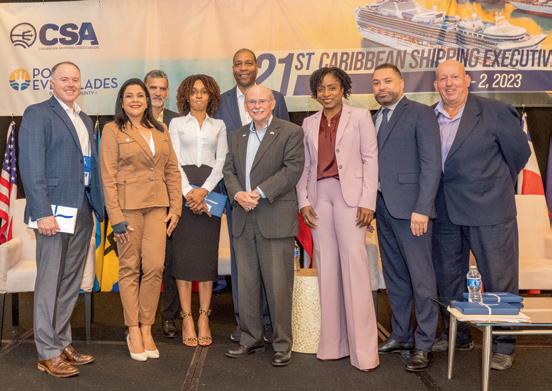
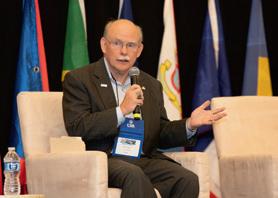
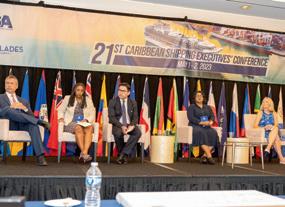
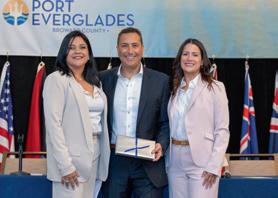

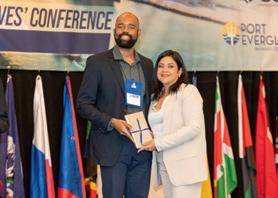
37 www.caribbean-maritime.com CSA CSEC 2023

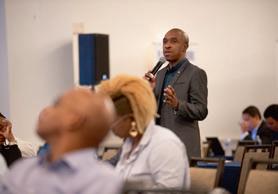
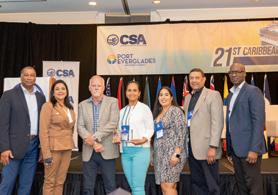
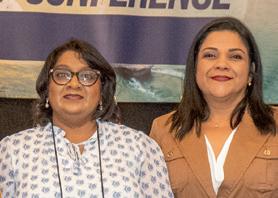


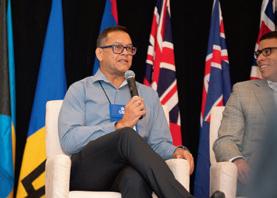
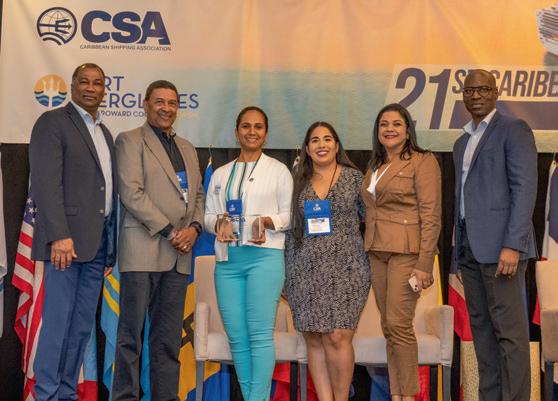
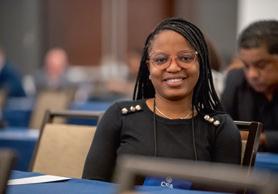



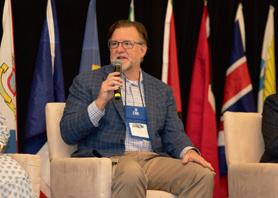

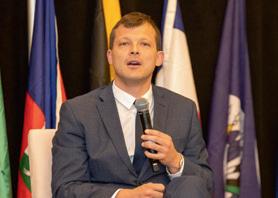
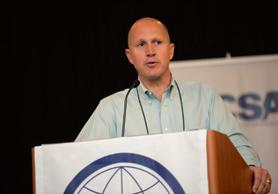

38 Caribbean Maritime | June-September 2023 CSA CSEC 2023
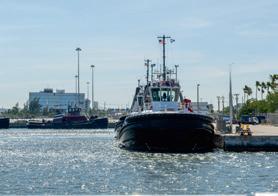
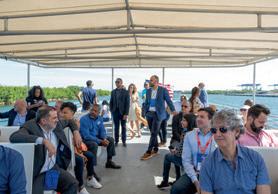

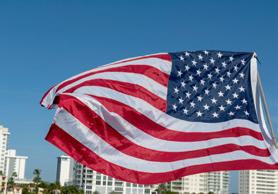
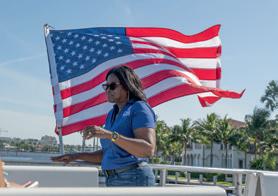
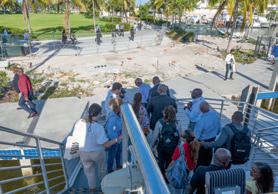
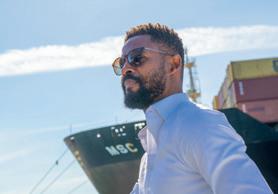
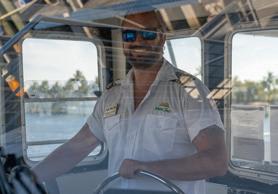

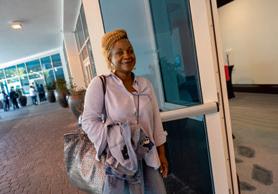
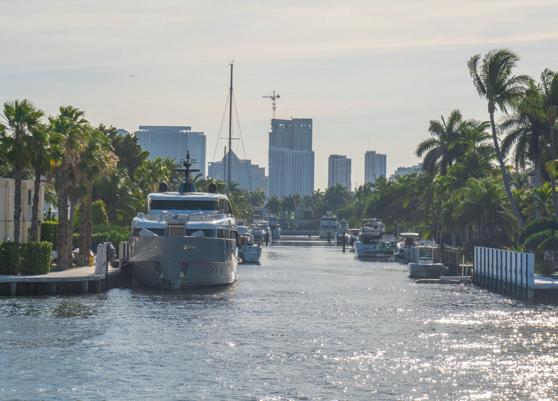
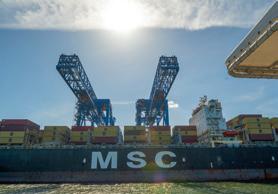

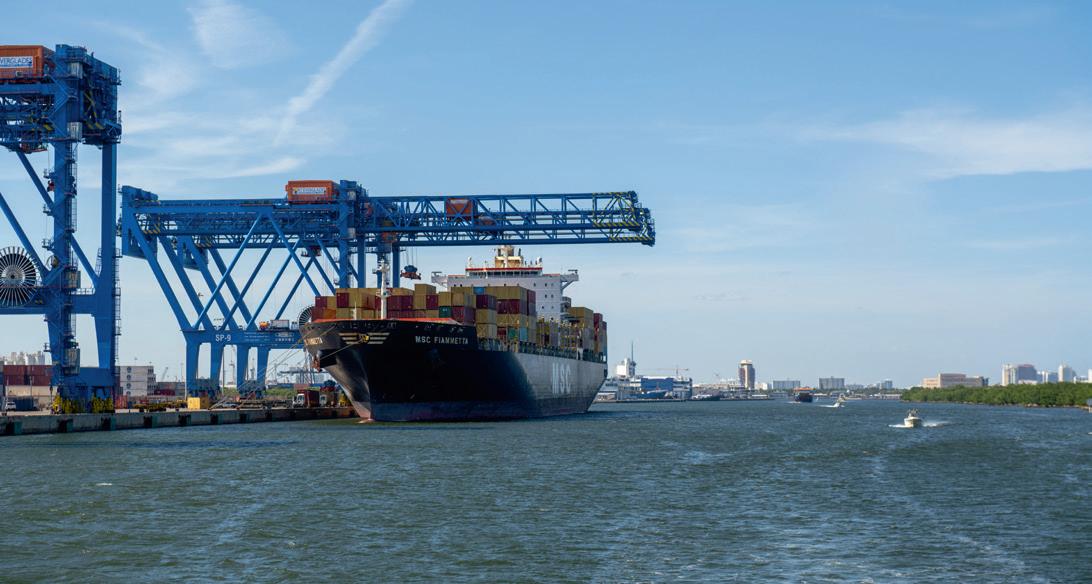
39 www.caribbean-maritime.com
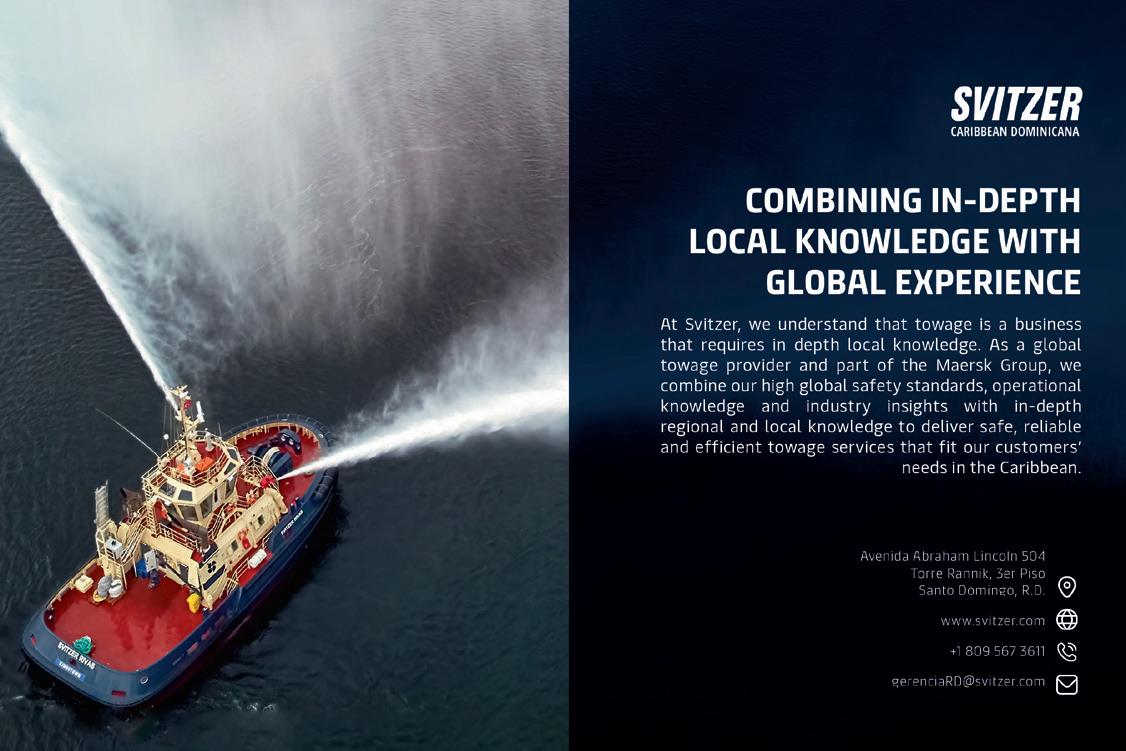
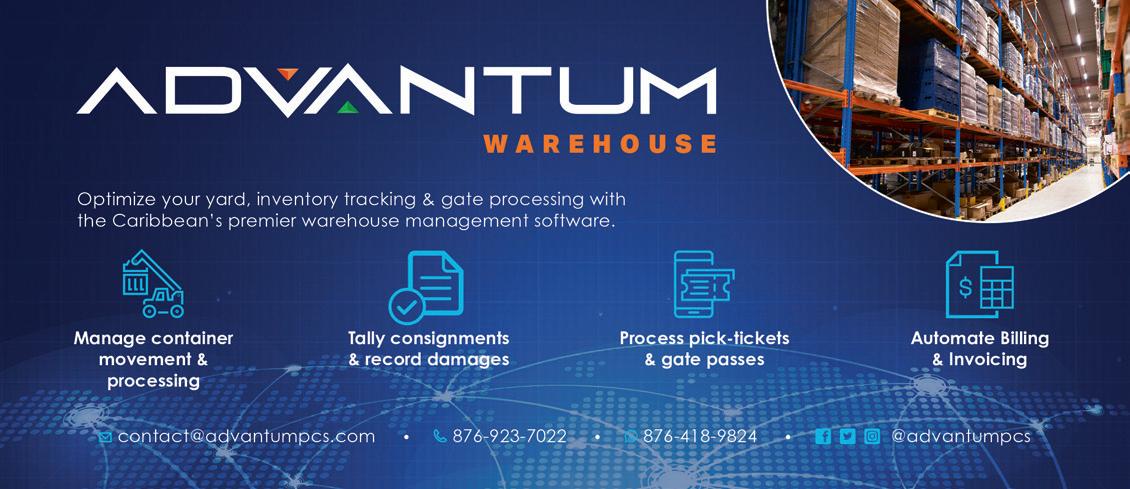
Tel: +44 (0)1206 752902 Email: publishing@landmarine.com www.landmarine.com INSPIRING CAPTIVATING INFORMATIVE Multi-platform publishing and design services
News from around the Caribbean Trinidad & Tobago
The idea has been on the drawing for around ten years, but there now seems to be some serious movement in the launch of Windward Ferries – a combined RoPax ferry operation scheduled to connect Port of Spain with Grenada and other Eastern Caribbean islands.
During a weekly rotation, the proposed service will also then link Port of Spain with St Vincent, Barbados and St Lucia before returning to St Vincent and Barbados and back to base in Port of Spain.
Windward Ferries hopes to commence operations by year-end 2023, but is still in the process of looking for finance/partners and a suitable 100-meter length ferry.
Guyana
Expansion plans are being considered for Guyana’s first floating dry dock, due to growth in the marine sector and attracting larger vessels to Georgetown.
Dock Yard (DY), the facility has been operational since January.
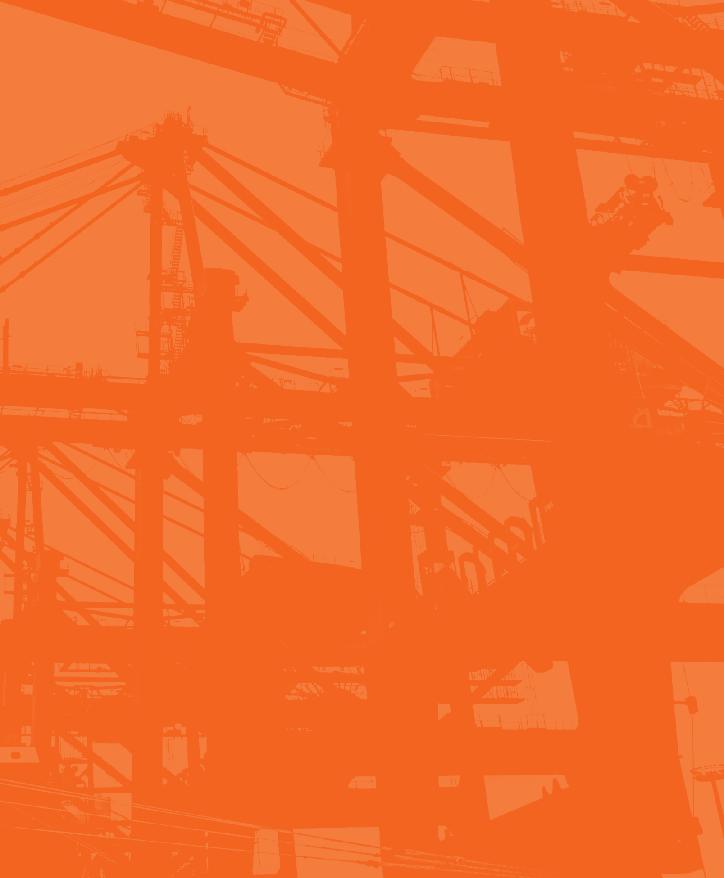
DY is a one-stop shop for fullmaintenance services for vessels and is located on the bank of the Demerara River. The facility has the capacity to service over 60 vessels annually.



Traffic on Guyana’s waterways has seen a sharp increase with the thanks to oil and gas activities offshore. Weekly port calls have risen to over 50 a week, up from just seven, two years ago.
Caribbean Maritime
roundup
Guyana
Paramaribo-headquartered VSH Holding has begun construction of a new VSH Commercial Complex, located in Houston Estate, Georgetown.
The new building is large enough to allow VSH companies and other small-to-medium sized companies to develop in the growing Guyana market.
Antigua
L’Express des Îles fast ferry arrived at the Nevis Street Pier in St John’s in April bringing 427 passengers from Pointe-à-Pitre, Guadeloupe to Antigua Cruise Port.
The Antigua & Barbuda Tourism Authority in collaboration with the Antigua & Barbuda Festivals Commission and Antigua Cruise Port welcomed the visitors.
Antigua Cruise Port General Manager, Dona Regis-Prosper said, “With our increased port capacity and focus on service quality, we can now accommodate more ferries. We are pleased to partner with the Antigua & Barbuda
The plot of land acquired in 2017 is around 40,500 square meters. The first building to be constructed combines warehouse and offices. A total of seven warehouse units and two office units will be offered for lease, with ample parking and open storage. All at a prime location. The VSH Group feels confident that the building can be completed by January 2024.
Tourism Authority and the Festivals Commission in creating the initial port-side welcome and look forward to future calls. As the Cruise Port Operator, we are always looking for ways to increase visitation to Antigua via the cruise port. We believe that ferries present an excellent option for interregional travel that can positively impact the port and destination.”
L’Express des Îles currently embarks passengers in Guadeloupe for both chartered day trips and regular fastferry services, locally to les Saintes and Marie-Galante as well as to Dominica, Martinique and St Lucia.
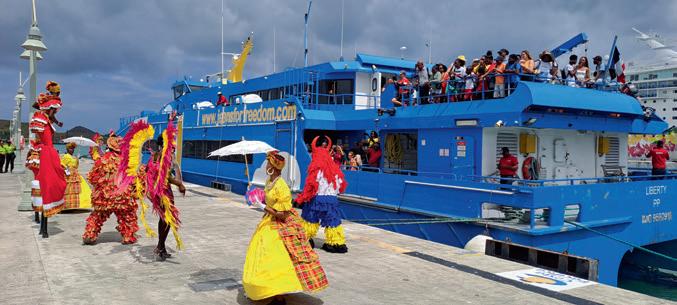
41 www.caribbean-maritime.com
????
Guadeloupe to Antigua ferry

Seaport Agencies
Seaport Agencies celebrated its 25th anniversary in Apri. Founded in 1998 as a privately owned company, the company has come a long way. Today, Seaport Agencies operates in Aruba, The Bahamas, Bonaire, Curaçao, the Dominican Republic, Trinidad, Panama and the United States, including the US Virgin Islands.
Years of experience have allowed Seaport Agencies to expand its expertise in a variety of areas: agency services, shipping, logistics, inspections, and oil transportation.
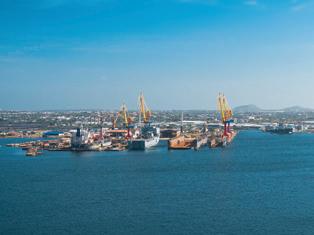




Intermarine
Intermarine has launched a new monthly liner service, the Mexican Connection, linking Mexico to the Caribbean, North Coast South America, and Brazil.
The first voyage from Veracruz took place in April with calls at Cartagena, Barranquilla, Santa Marta, Point Lisas, Georgetown, and Rio de Janeiro.
Colombia
Sociedad Portuaria de Santa Marta is extending its Pier 6 by an additional 100 meters to have a berthing line of 405 meters in length, which will allow two Supramax vessels of up to 200 meters in length to operate simultaneously.
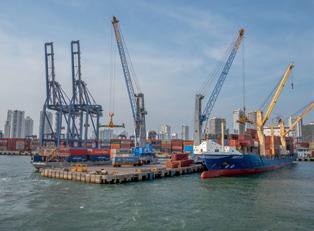
During the construction period it had been necessary to restrict berthing on this pier given the mooring limitations.
In May the first part of the expansion under construction entered service with 32 meters of quay, with three fenders, allowing ships to dock safely. This work will continue until berth 6 is complete.
Sociedad Portuaria de Santa Marta continues to make investments in facilities to that make foreign trade operations more effective and safer.
Guyana
Bourbon Guyana becomes the first Guyanese offshore support vessel OSV operator.

This has resulted from a partnership with the Guyanese company Thetys Marine & Logistics, which becomes a 51% shareholder of the Bourbon Guyana joint-venture.
The company will provide a full range of marine services with a fleet of six vessels (large platform support vessel, anchor-handling and regular tugs).
“We share the same culture with Bourbon and our visions for the future of the industry in Guyana are aligned. It is very important for Bourbon Guyana to consolidate its leadership position in this promising territory,”
said Jaikerran Persaud, CEO of Tethys Marine & Logistics.
With 75 per cent Guyanese directors, Bourbon Guyana has therefore become the first indigenous offshore support vessel operator, fully compliant with the most recent local content regulations.
“The partnership with Tethys Marine & Logistics represents a tremendous opportunity to strengthen our current position in Guyana,” said Rodolphe Bouchet, CEO of Bourbon Marine & Logistics.
“Through this operation, Bourbon becomes a “Guyanese” company in country with a local majority shareholder. This is a very important aspect
for us, as we always want to include local content in the territories in which we are present.”
Bourbon Guyana has operated in the country since 2019, supporting ExxonMobil Guyana and Saipem Guyana for the development of the Stabroek field.
43 www.caribbean-maritime.com
News
the Caribbean roundup Caribbean Maritime
from around
Cartagena
Curaçao
Ngrane / Shutterstock.com
Jeff Whyte / Shutterstock.com
Bourbon Guyana
Venezuela
Chevron Corp is urging Venezuela to clean up Lake Maracaibo in the hope of almost doubling the amount of oil that can be loaded on its ships, which currently risk running aground due to sediment.
The US firm is funding a study for state oil company Petróleos de Venezuela (PDVSA) to measure the mud in the water.
The study is intended to guide dredge work that PDVSA would then carry out via a contractor. That dredging could allow Chevron’s ships to increase their current cargoes, following an easing of US restrictions on operating in Venzuela.
Chevron began shipping from Venezuela and trabsports Venezuelan crude from Maracaibo to US Gulf refineries.
CSA

A memorandum of understanding was signed by CSA President Lindsay Marc Sampson and CSA General Manager Milaika Capella Ras and Inter-American Development Bank Vice President for Countries Richard Martínez in Panama in March.
The two parties to the MOU seek to act in reducing the environmental impact of shipping and port services in the Caribbean.
The partnership aims to accelerate the decarbonization of the shipping and ports industry, promote the circular economy, strengthen economic and social development, and increase the efficiency and effectiveness of shipping-related activities and services. It is hoped that by working together, the


Mississippi
The Mississippi State Port Authority has entered into a long-term lease and operating agreement with New Jersey-headquartered Ports America – the largest US terminal operator and stevedore.
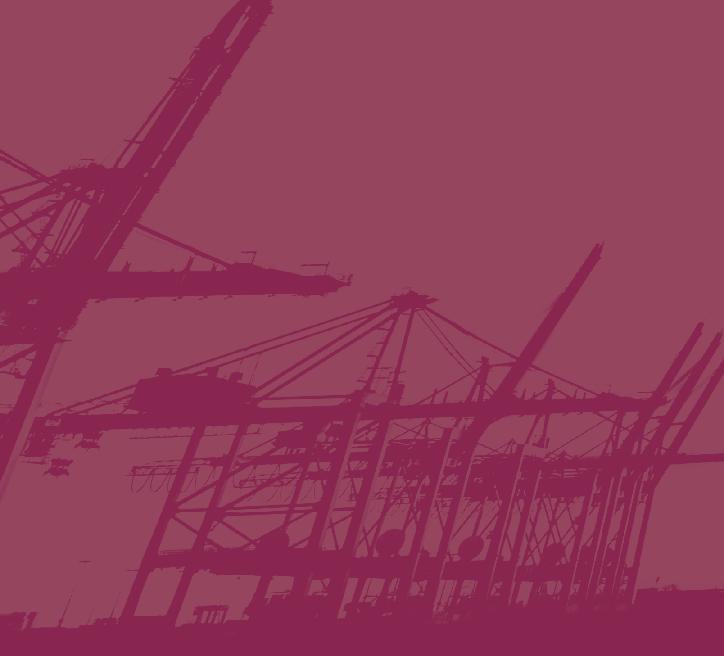

The Port of Gulfport and Ports America have a longstanding relationship, with Ports America acting as a licensed stevedore at the port since 2006.
In September last year, the Port of Gulfport and Ports America entered into a Letter of Intent signalling their mutual intent to work together. Based on that Letter of Intent, the resulting lease and operating agreement includes a 20-year term with the option for two additional ten-year terms available to Ports America.
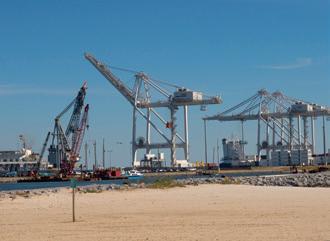
A key feature of the deal is a US$
43 million investment from Ports America to develop Gulfport’s vacant Terminal 4 into a cargo-handling terminal. This includes a new ship-toshore crane.
The partnership should also result in increased ship traffic and provide a basis for the Port’s ongoing project to deepen and widen the channel.
Guyana
CSA and the IDB can create more opportunities for cooperation and collaboration that will benefit the region.
Greenhouse gas emissions relating to Latin America and Caribbean exports have increased over the past 30 years, partly due to the growing importance of the maritime transport sector.
Groupage operator JP Shipping Services has launched a weekly container service from the UK to Georgetown with a 11-day transit time. The first sailing was in March.
This expands JP Shipping Services’ current offering for FCL, LCL and vehicle shipments for both commercial and private customers. Whether it’s a full load of commercial pallets, house clearance, machinery, larger household goods, personal effects in barrels, cartons or parcels, JP Shipping Services have it covered.
44 Caribbean Maritime | June-September 2023
News from around the Caribbean
Caribbean Maritime
Port of Gulfport
roundup
clayton harrison / Shutterstock.com
Dominica
The Government of Dominica has nominated Dr Cleopatra Doumbia-Henry, currently president of Malmö’s World Maritime University as a candidate for the position of Secretary-General of the London headquartered International Maritime Organisation (IMO). (See also CM issue 39)
Dr Doumbia-Henry comes with vast knowledge, expertise and experience in senior management roles of international organisations, including the IMO, the United Nations and the International Labour Organization.
The IMO, has responsibility for the safety and security of shipping and the prevention of marine and atmospheric pollution by ships.

Dominica’s Minister for Foreign Affairs, International Business, Trade & Energy, the Honourable Dr Vince Henderson said the Government of Dominica is confident that Dr. Doumbia-Henry is fully qualified and experienced to serve as Secretary-General of the International Maritime Organisation. The election will take place in July 2023 during the 129th session of the IMO Council.
Antigua & Barbuda
Tropical Shipping’s Tamara Lowe (and current president of Women in Maritime Association Caribbean) has a new position with the company having switched from her native Dominica to a new role as island manager for Antigua & Barbuda.
Costa Rica
Costa Rica is preparing to unveil a new-look cruise terminal in Puerto Limón.
As part of the upgrade and relaunch, the terminal’s exterior will undergo a significant redesign. At the same time, investments from the Costa Rica government and local stakeholders will improve the public and artisanal areas and offer enhanced services for visitors.
As a result, cruiseship passengers can expect a new experience when they arrive at the Hernán Garrón Salazar port terminal. The muchneeded upgrade of the Hernán
Jamaica
CMA CGM has started the deployment of Neo-Panamax container ship son its PEX 2 service, the French shipping line’s dedicated weekly, direct, and fast service from Asia to the Caribbean and Latin America.
This resulted in the CMA CGM Argentina becoming the largest CMA CGM vessel to call at Kingston Freeport Terminal after arriving from Cartagena en route to Caucedo.
On this call, more than 6,300 container moves (over 11,000 TEU) will be handled by KFTL, a significant addition to the weekly rotation.
Representatives from the Port Authority of Jamaica, Embassy of France and CMA CGM Jamaica joined KFTL to welcome the vessel on its inaugural stop in Kingston. CEO and President of the PAJ, Professor Gordon Shirley, underscored the PAJ’s commitment to supporting its partners in opening trade flows to Jamaica.
Garrón Salazar port terminal’s infrastructure will see the quality of services more in line with international standards.
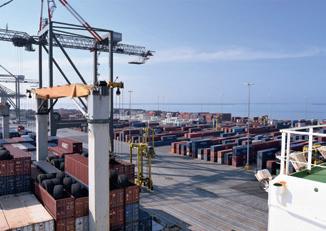
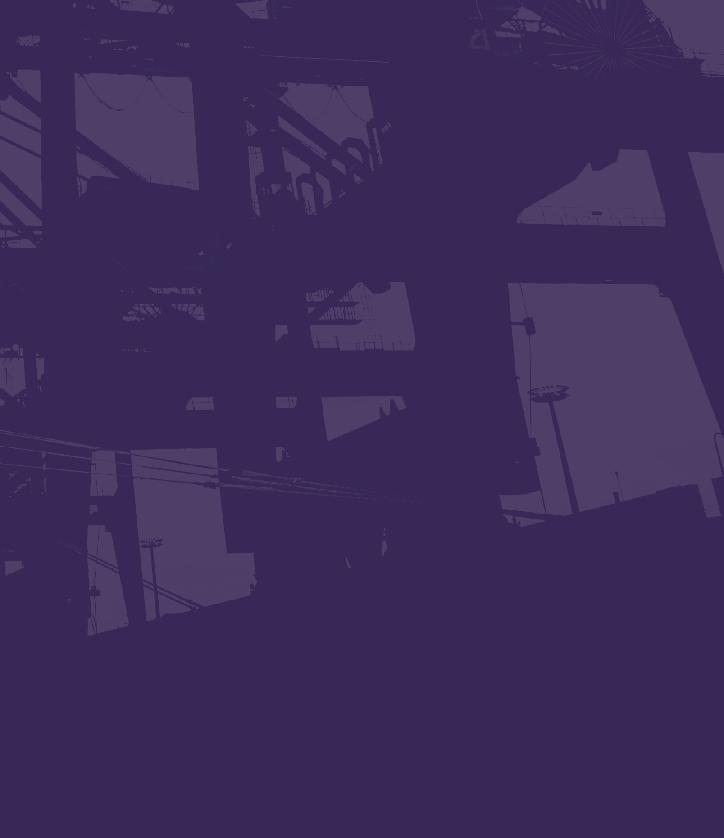
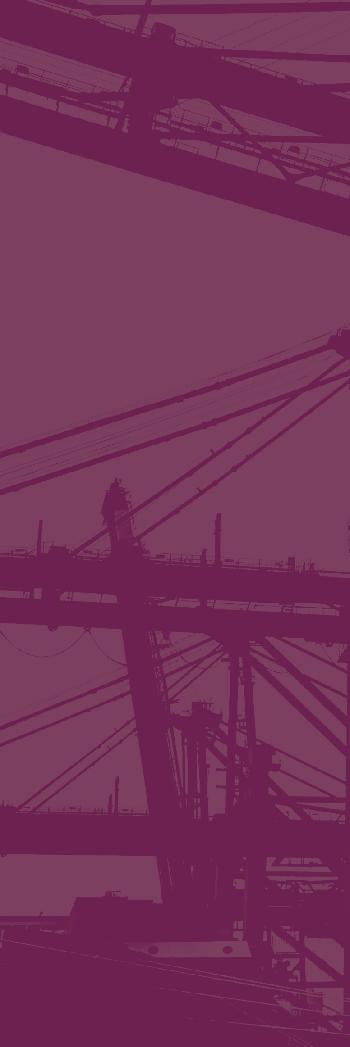
Andrea Centeno, Executive President of the Junta de Administración Portuaria y de Desarrollo Económico de la Vertiente Atlántica de Costa Rica (JAPDEVA), says: “We want to take their breath away right from the first glance so that they will go on to fall in love with the flavor, natural surroundings, music, culture, and beauty of the cantons of this Caribbean province.”
“The Port Authority is pleased that CMA CGM is increasing its volumes to Kingston and strengthening the trade connection between Asia and the region, which contributes to the development of Jamaica’s logistics industry.”
“We are ready for more volumes,” said CEO of KFTL, Capt. Jedrzej Mierzewski. “KFTL’s recent investments in new equipment, the ongoing upgrades to the terminal along with the addition of frequent large vessels like this one, show that Jamaica is open for business!”
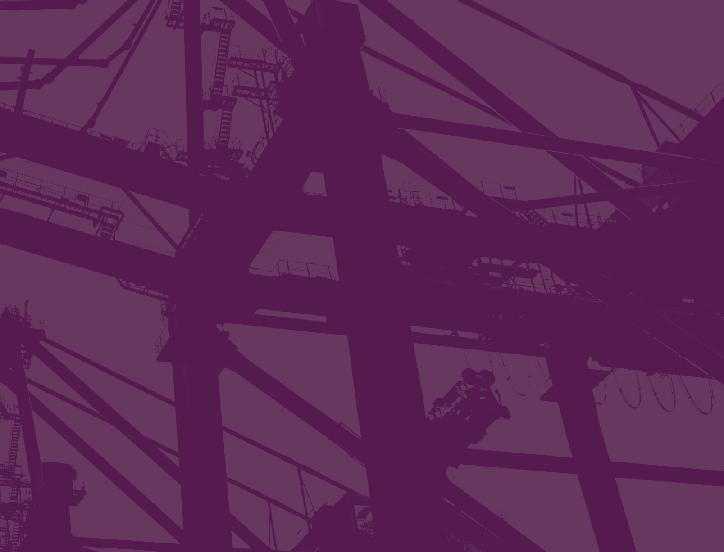
45 www.caribbean-maritime.com
Kingston Freeport Terminal Luciavonu / Shutterstock.com
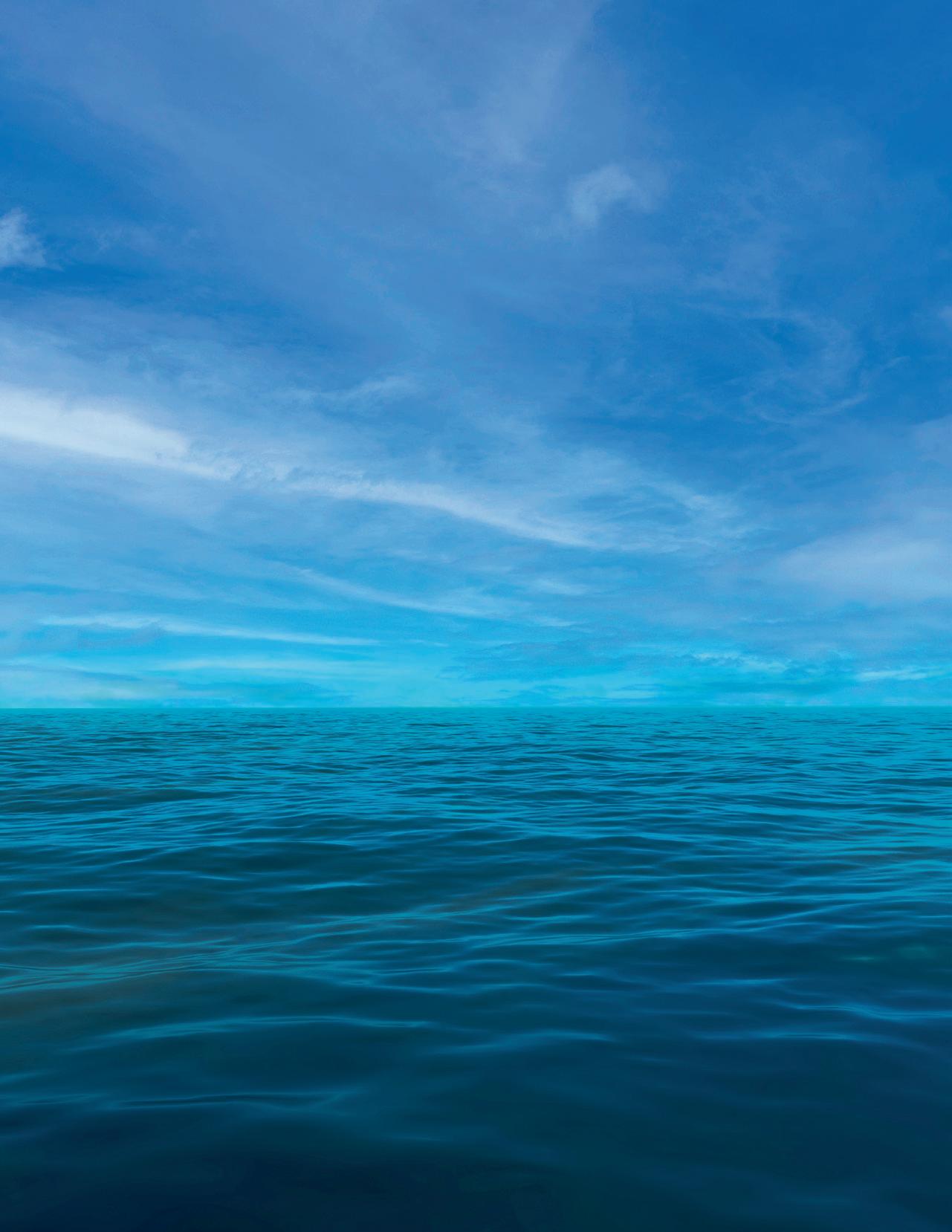
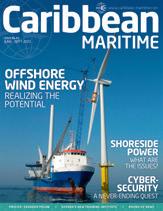
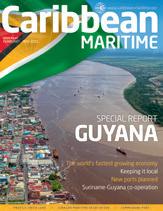
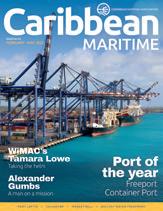
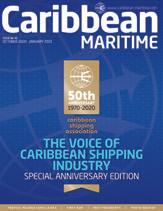


Caribbean Maritime magazine is published three times a year and is mailed throughout the region and beyond to subscribers in both hard and soft copy, has its own dedicated website, can be downloaded from the CSA website and is available across multiple social media platforms. Book your advertisement in the next issue now to reach Caribbean Maritime’s unique and highly influential readership - contact us advertising@caribbean-maritime.com CaribbeanMaritimeMagazine cm_magazine @caribbeanmaritimemagazine www.caribbean-maritime.com All back issues available online: qrs.ly/mdbz822 View and download free
Caribbean Maritime the official journal of the
Advertise in
Navigating Cybersecurity and Data Privacy

Key takeaways from the CSA Shipping Executives Conference
Cybersecurity threats are rampant in every industry, and the shipping industry is no exception. The panel discussion at the 21st Caribbean Shipping Association Shipping Executives Conference titled "Navigating Cybersecurity and Data Privacy" shed light on the importance of cybersecurity and ways to mitigate attacks. The panel was moderated by Frances Yeo, CEO of ADVANTUM - the Caribbean’s premier Logistics Software and IT Network services provider, and featured presenters John Gibson, Cybersecurity expert and CEO of PROTECTIFIQ, and Glaister Leslie, Technology & Change Management Consultant. Here are the key takeaways from the discussion that every shipping executive needs to know.
The Impact of Cybersecurity on Everyone
The first key takeaway is that cybersecurity should be a concern for everyone. The panelists emphasized that no industry is immune to these threats, and even if your business is not directly affected, you can still be indirectly impacted through your partners, suppliers, customers, and even the ports if they experience an attack. Cyberattacks can take many forms, including crashing systems, stealing data, and locking users out of their systems which Glaister Leslie likened unto someone burning down your warehouse, or stealing your cargo inventory or locking you out of your business place. These can lead to billions of dollars in losses, and
not to mention the priceless cost of your business’ reputation.
Ways to Protect Yourself from Cyber Attacks
To mitigate the risk of cyber-attacks, Cybersecurity expert, John Gibson stressed that it's crucial to employ rigorous cybersecurity management measures. These include implementing network security, installing anti-malware, conducting periodic vulnerability and penetration tests, and implementing multifactor authentication, among others. He advised that it’s also essential to encrypt data, conduct periodic vulnerability and penetration tests, and implement identity and access controls.
Gibson reminded everyone that, “Security is a risk journey, and it's important to
47 www.caribbean-maritime.com SECURITY BY
constantly assess and review mitigations to ensure you're in a tolerable place.”

The People Side of Cybersecurity
Cybersecurity is not just a technical issue but also a people issue. On the people side, change management is crucial. Glaister Leslie suggested that using a change management framework such as Kotter's 8-Step Change Model can help. This includes creating urgency, forming a powerful coalition, creating a vision for change, communicating the vision, removing obstacles, creating short-term wins, building on the change, and anchoring the changes in corporate culture. He emphasized that it's also important to avoid pitfalls such as letting fears get the best of you, ignoring the impact of technology on people, and investing in technology at the expense of investing in people.
AI and Privacy Concerns
During the Q&A session, the panelists also addressed privacy concerns around artificial intelligence. They highlighted that whatever you put into AI can become part of an answer for someone else, so to ensure not
to share confidential data with the chat systems. Also highlighted was the fact that AI technology is being used to create malicious programs faster, so everyone needs to remain vigilant.
Recommended Next Steps
So, what are the next steps for us as we return to the office? According to Glaister
Leslie, shipping executives should start at step one of the eight-step change management process and answer critical questions about what they need to protect, what's standing in their way, what's in place, what's planned, and how they'll measure success.
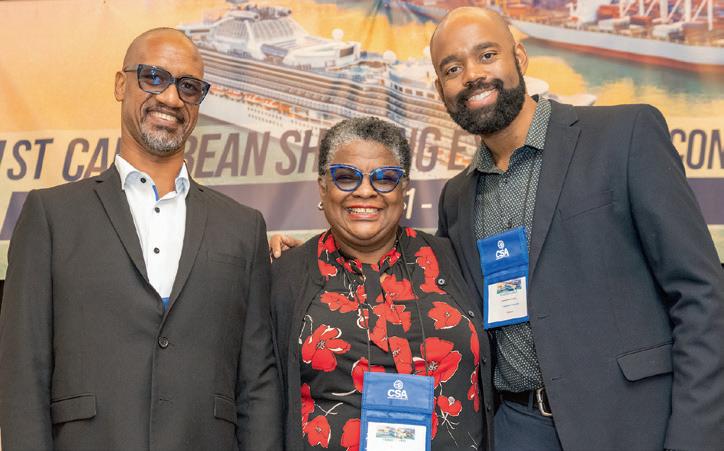
John Gibson says businesses should also complete a cybersecurity maturity assessment, implement a disaster recovery plan that contains cybersecurity and data protection procedures, and establish a cybersecurity baseline for their organization. Most importantly, we should all keep learning and training your people to ensure a strong cybersecurity culture. Businesses can also reach out to cybersecurity experts like PROTECTIFIQ and ADVANTUM for support.
Strong cybersecurity and data privacy policies and practices are essential in securing our global supply chain. While we may not be able to prevent all attacks, if we take proactive measures to protect ourselves, our business partners, and our customers, we can ensure a more secure and resilient shipping industry.
For more information, visit ADVANTUM’s website at www.advantumpcs.com or email contact@advantumpcs.com
48 Caribbean Maritime | June-September 2023 SECURITY BY
Cybersecurity is not just a technical issue but also a people issue. On the people side, change management is crucial”
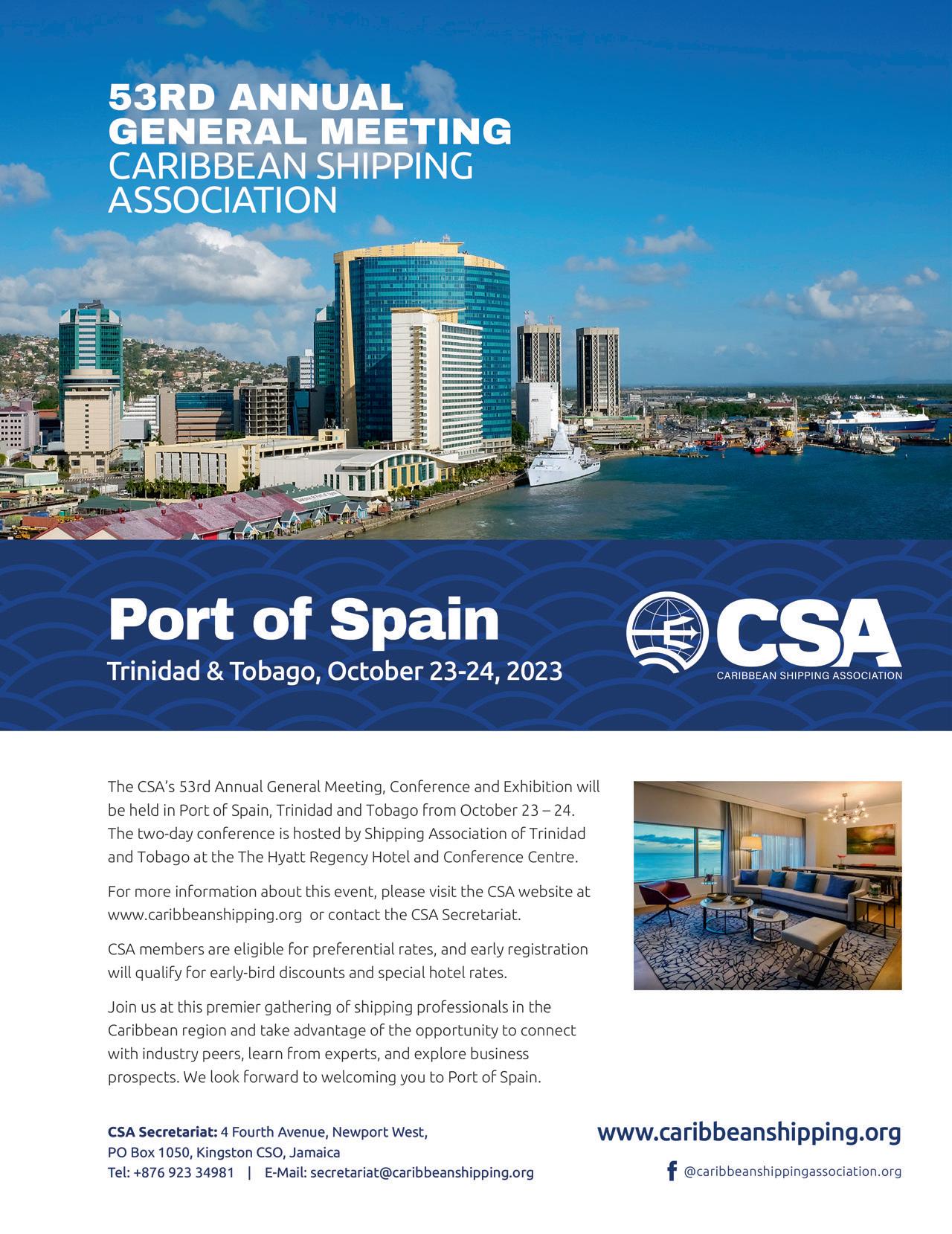
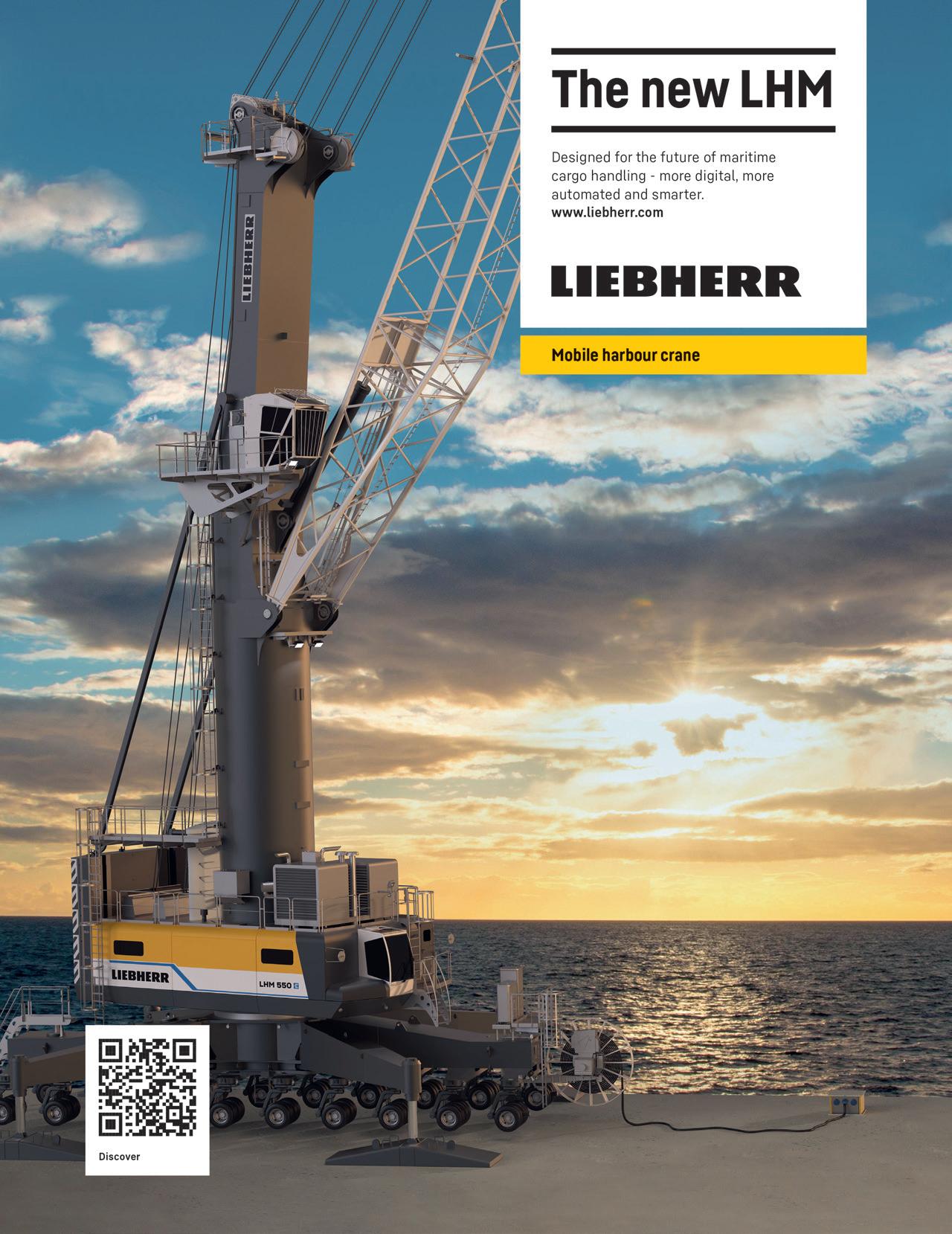










































 by Gary Gimson
by Gary Gimson









































































































































